


































































































Welcome to the Autumn edition of Business in East Tāmaki. In this issue we look at Sustainability and what this means in our business environment. This issue is particularly relevant when we look at how our built environment has been challenged by Auckland’s recent floods and storms, occurring as a result of the changing weather patterns. In this edition, we focus on sustainability in transport, community, construction, waste and other themes, including the upcoming EV Showcase at Transnet’s facility at the end of March.
We also cover an overview of the Business East Tāmaki proposed Shared Transport Project, being run collaboratively with interested local businesses, with transport shuttle service options to take employees from existing transport hubs to the workplace. This is very relevant to us, because a recent Waka Kotahi assessment found that East Tāmaki was the most car-dependent location in the country due to the limited public transport options, and the distance many commuters are travelling to reach work. This project’s relevance is underlined by the companies that are interested in developing the project to solution(s). Read more about this on pages 10 and 11.
The economic and political environment in New Zealand has also moved quickly in the last month or so. Economic indicators are showing a technical recession, fuelled by interest rates exceeding GDP. While this will hit households with increased mortgage payments, my feeling is that the business economy is flat-out with order books,
limited only by the inability to meet staffing numbers. My view is that the change in Prime Minister and the upcoming election cycle may also benefit business with further tweaks to immigration settings and a focus on businesses driving the GDP economy, as opposed to high Government spending and inflation.
Look out for the article on the Eastern Busway update; how they’re recycling demolished homes, showing that sustainability is a significant KPA for this project too. I hope you enjoy your read, and I take the opportunity to wish you all the best prospects for Business East Tāmaki in the burgeoning year ahead.
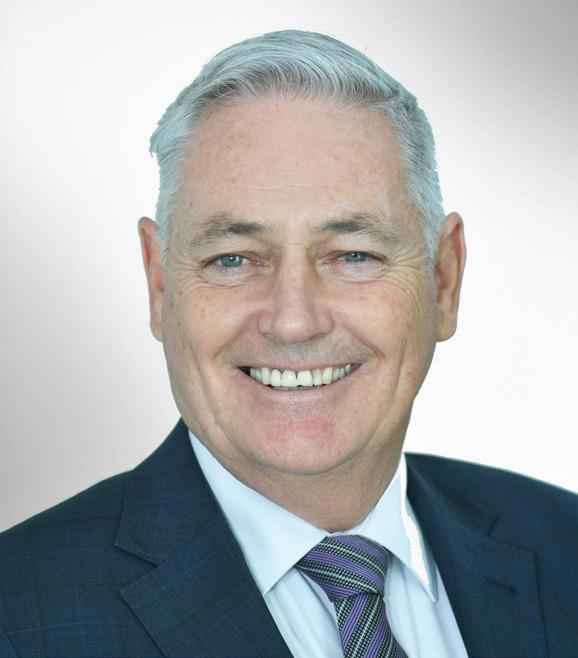
Business East Tāmaki is partnering with Green Gorilla to provide East Tāmaki businesses with a solution for commingled recycling and food waste/compostable items.
There has been a recent increase in burglaries and thefts which have targeted funds stored on site. Please contact Karen operations@businessET.org.nz if you would like one of these No Cash signs to help deter would-be offenders.
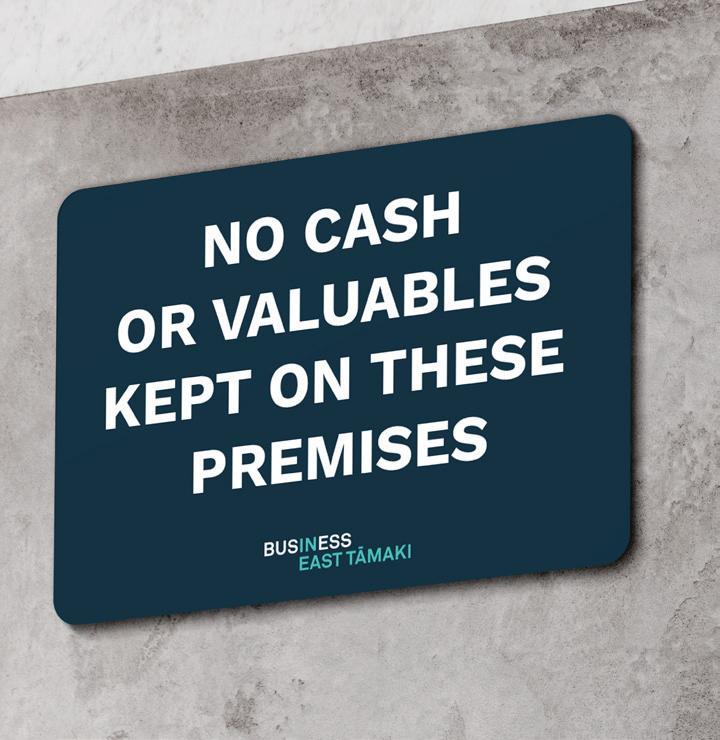
Next time you drive around Ti Rakau Drive, Springs Road or Harris Road, look out for our newly designed plinths which continue our rebranding exercise. We would like to acknowledge the support for these installations from the Howick Local Board.
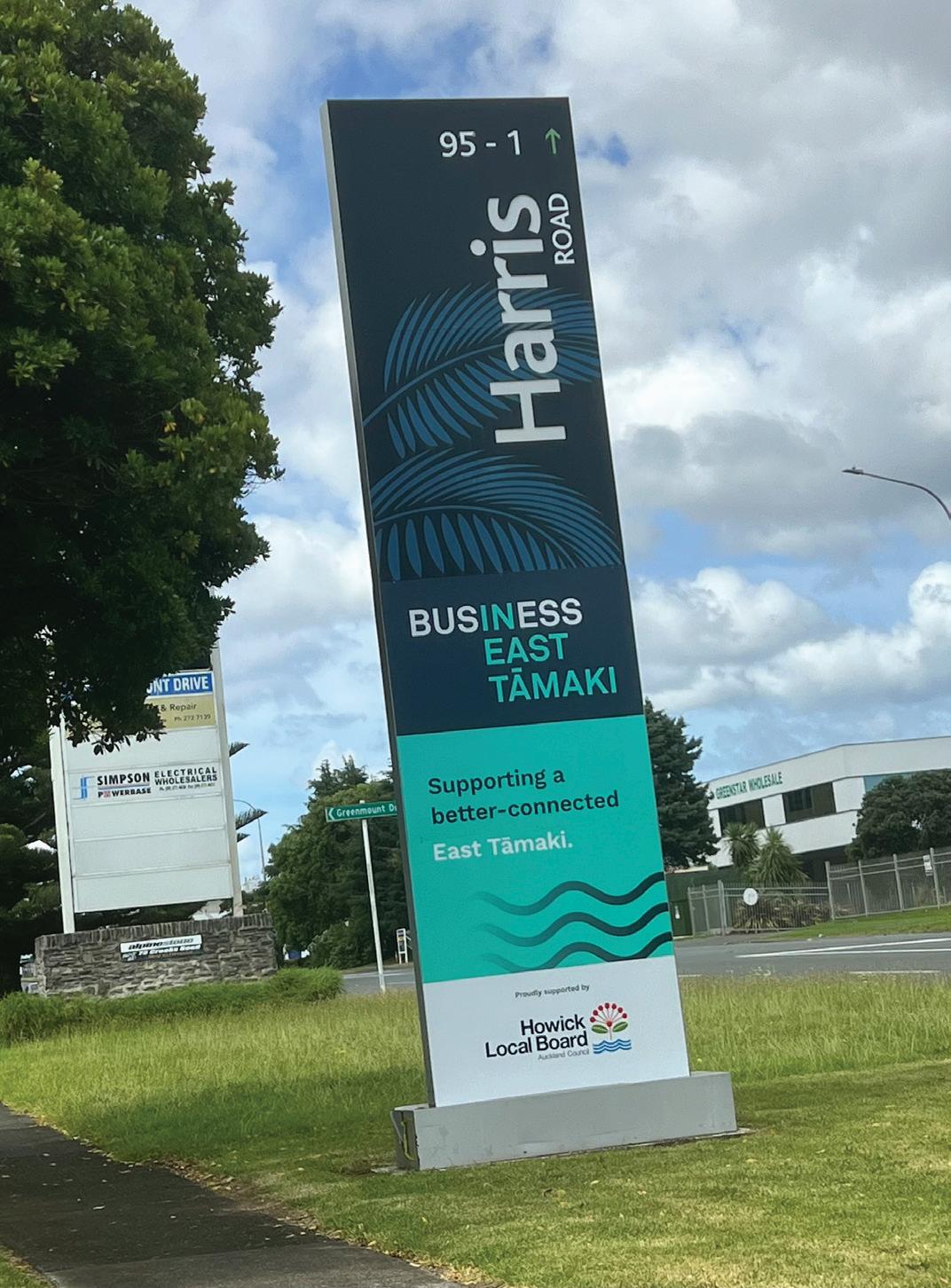
• We will visit your business to determine the correct solutions for your site, and whether or not you decide to sign up directly with Green Gorilla at the end of the free collection period, the internal bins are yours to keep.
• We will pay for the first 12 collections of the food waste external bins – these are also free, together with the bin liners.
• Along with food waste, you can dispose of other items such as bathroom paper towels, compostable packaging, teabags and many other items.

We believe our business district should have the opportunity to recycle the same items as residential areas – this can now be available to your business.
Contact Karen at operations@businesset.org.nz to register your interest.
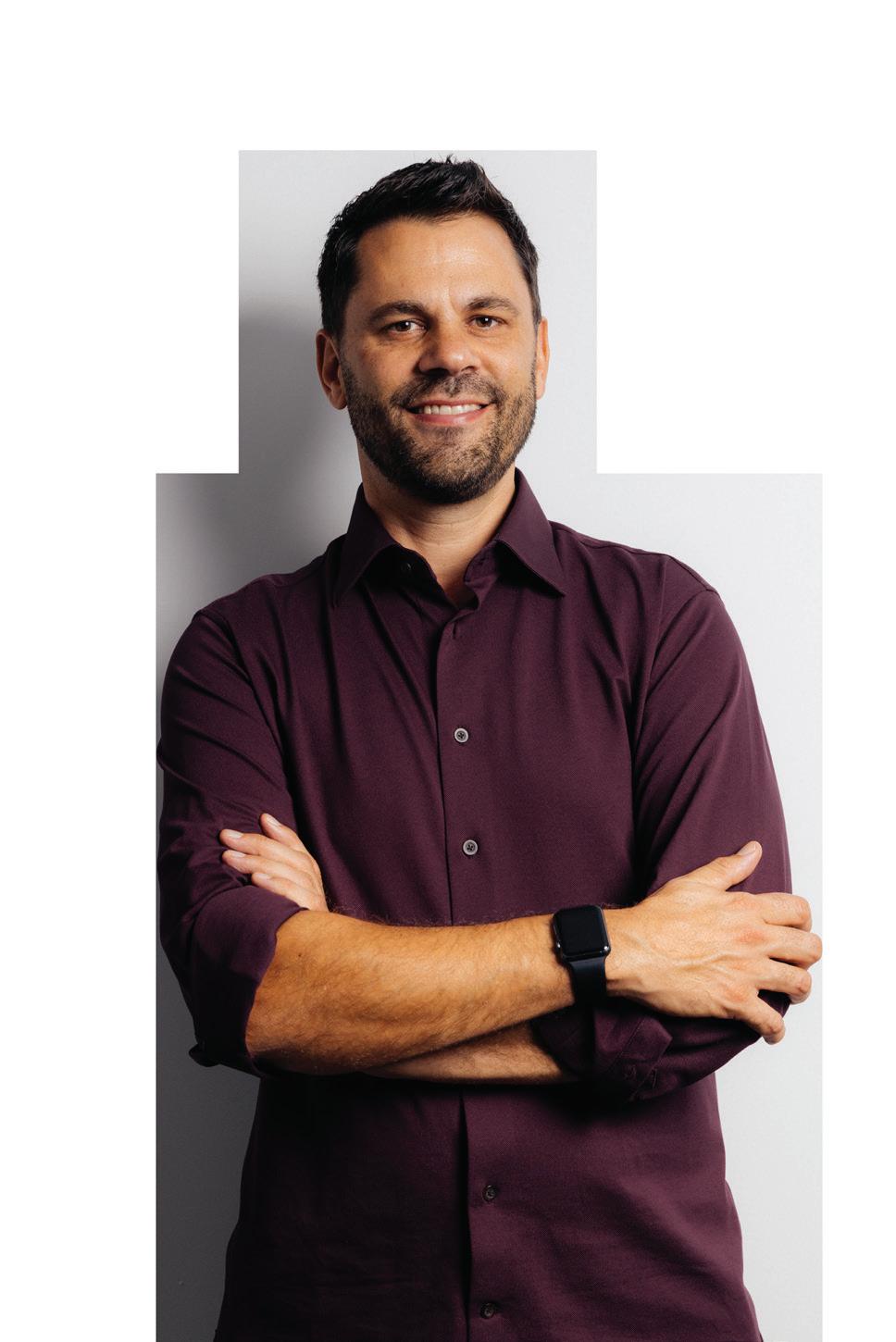
Business East Tāmaki’s primary focus is to support and champion the Business Improvement District’s (BID) 4,000 business and property owners and 30,000+ employees.
If you manage, own or rent a business or property within the BID, you are eligible to be a member of Business East Tāmaki. There is no extra cost to your business as membership is already taken care of via a targeted rate.
Advocacy
We provide a coordinated voice for matters affecting East Tāmaki business and property owners.
Business Support
We link you to current business resources and information to help your business grow.
We provide avenues to raise your business profile through our publications, website, social media, advertising, free directory listings, showcase hosting and sponsorship opportunities.
We provide opportunities to learn new skills and develop your network at regular breakfasts, business showcases, seminars, and interest groups.
Crime Prevention
We provide a range of initiatives to ensure East Tāmaki is safer for everyone.
Troubleshooting
We save you time and frustration as the conduit to help businesses with Auckland Council/infrastructure regulatory issues.
The team at Business East Tāmaki has recently had several enquiries from local female business leaders looking for a networking group of like-minded people. The aim of the group would be to connect people together and to help identify opportunities within the business community.

Women supporting women is a proven methodology for success, helping others to encourage, support or provide contacts to enrich your business and your career.
Our first event took place on International Women's day earlier in March. At that event, we received expressions of interest in forming a Women’s Networking Group and have since surveyed the attendees to establish what frequency, topics and timing of future networking events would be of most value. More news will be available about this in our Winter magazine.
If you would like to participate, or would like further information, contact Ruth White at gm@businessET.org.nz
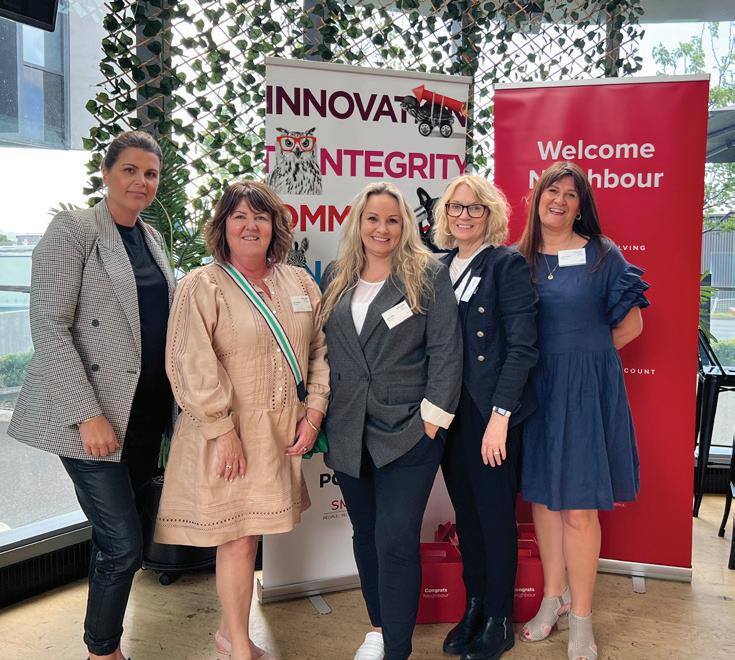
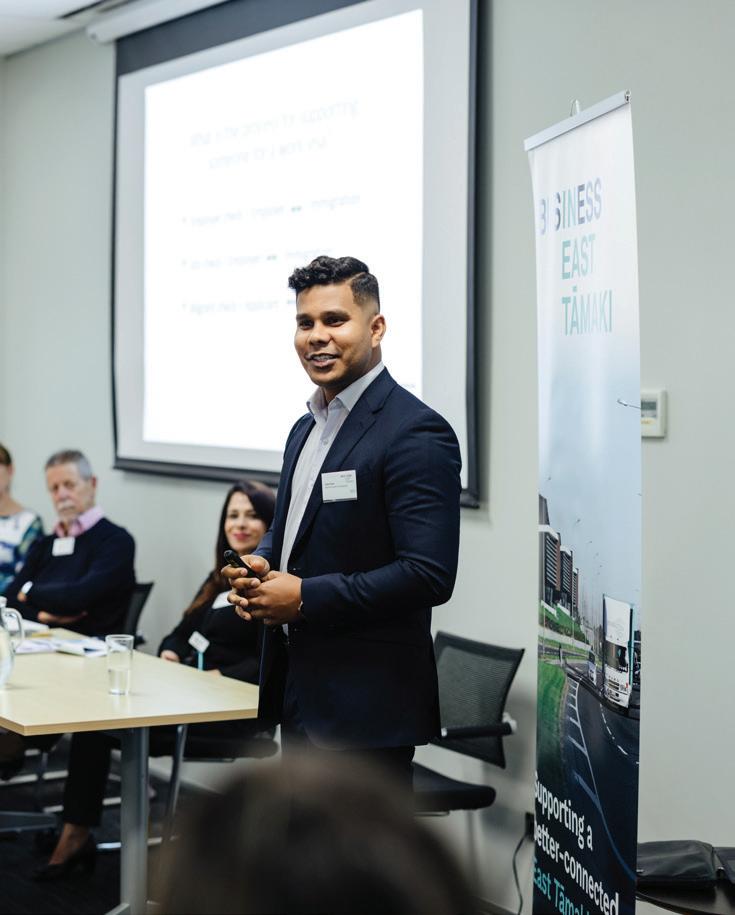
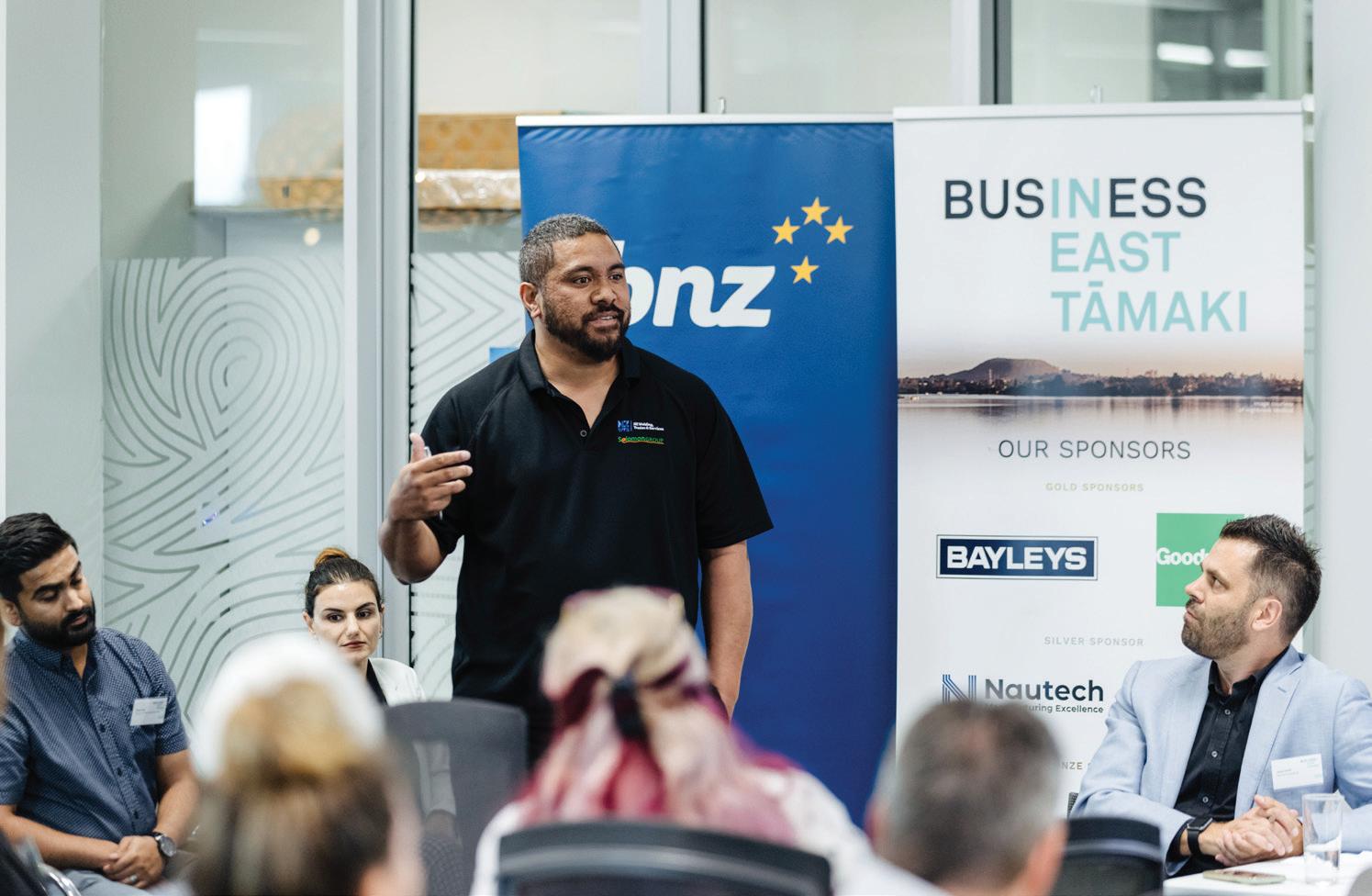
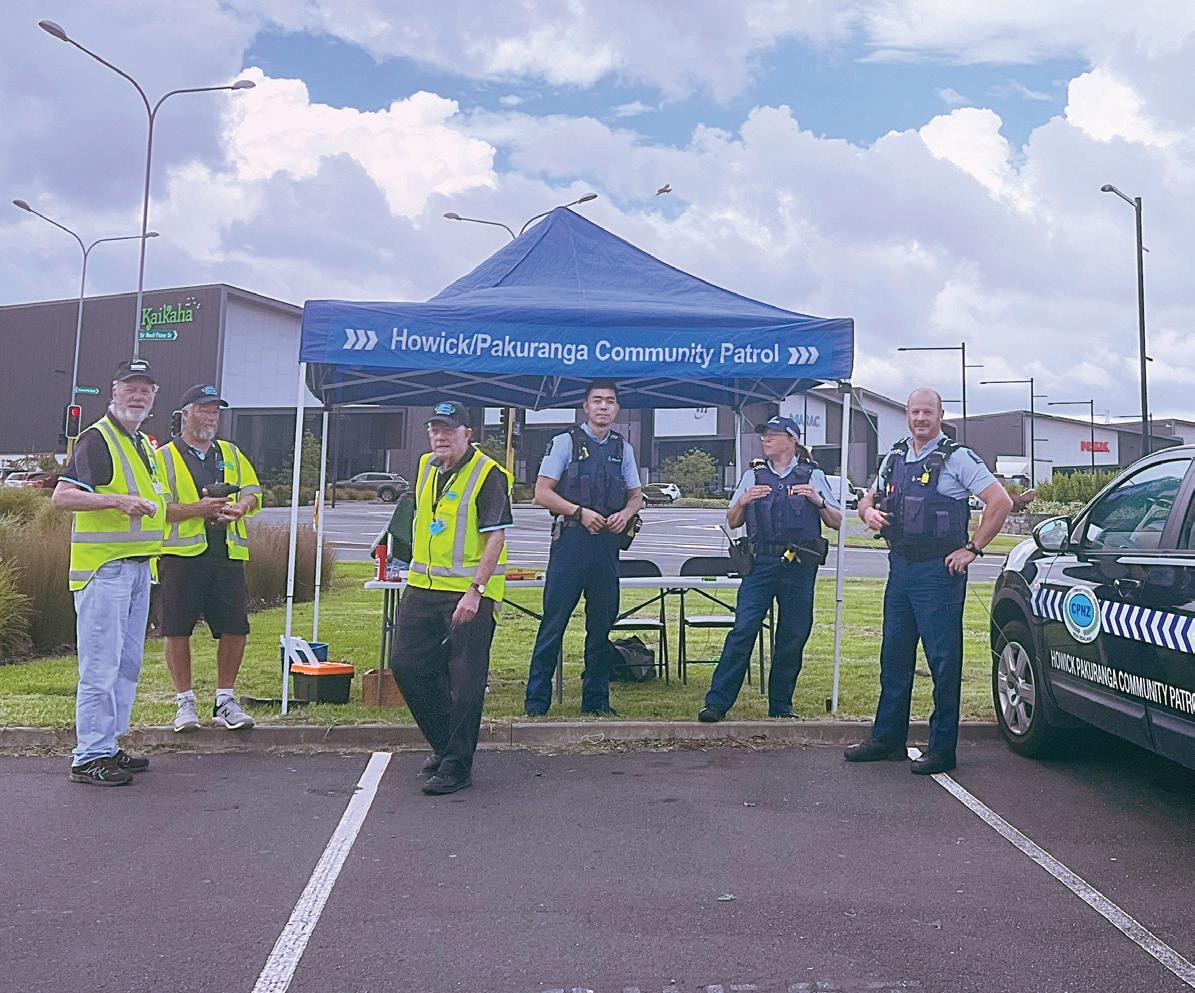
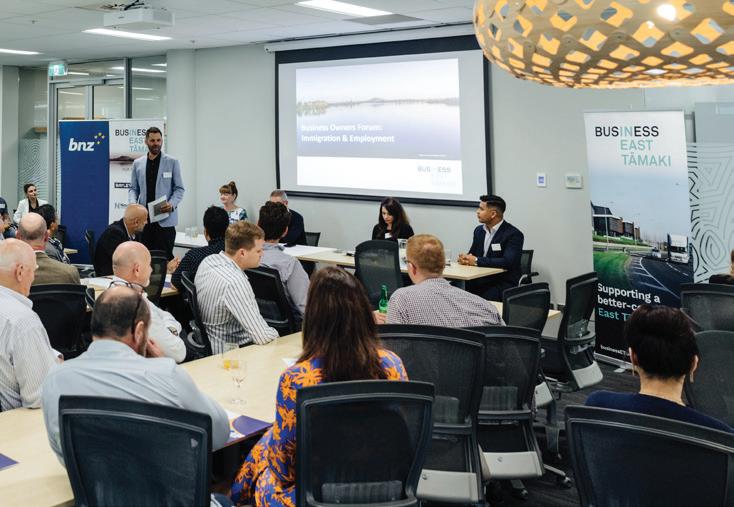
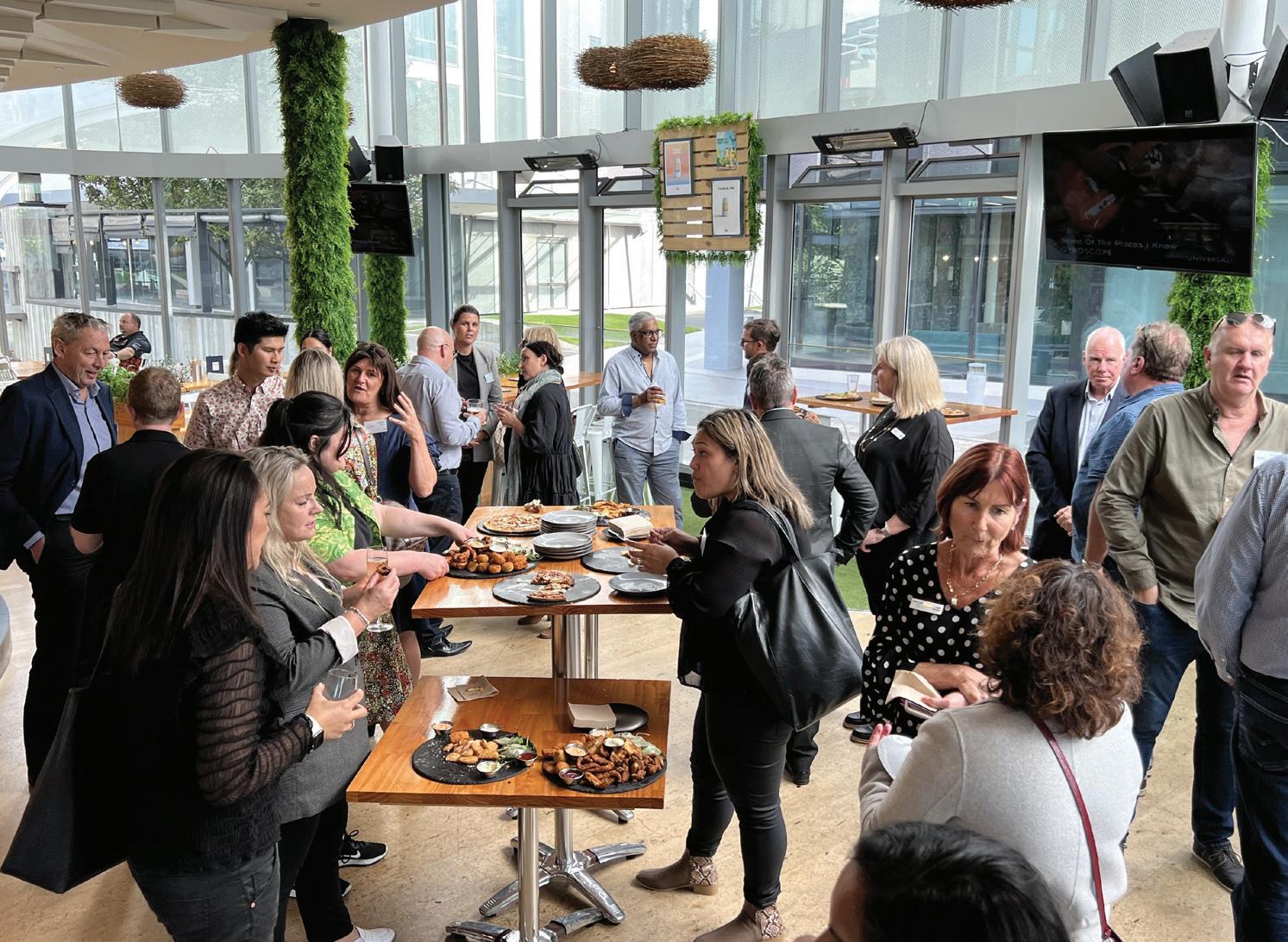
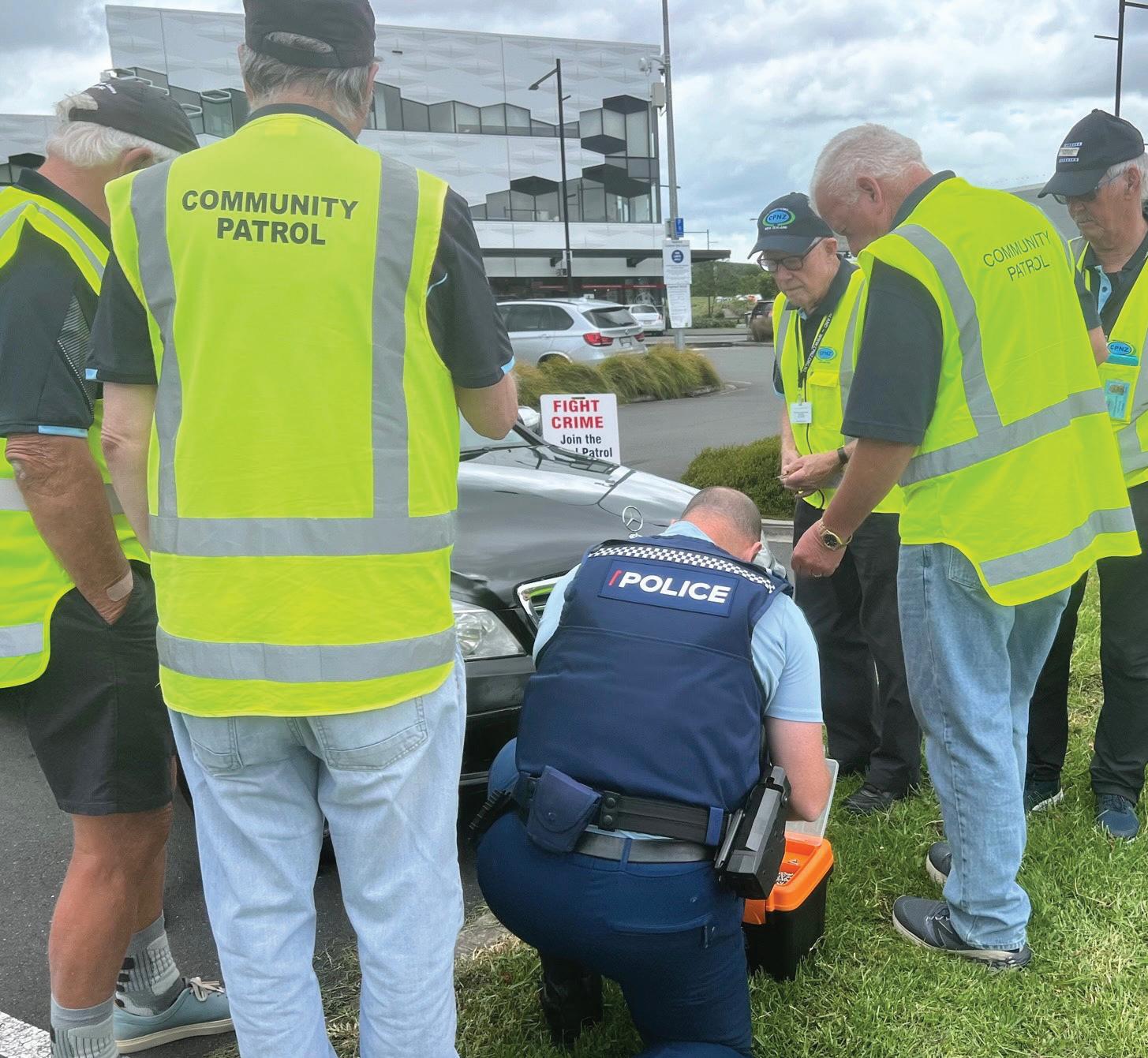
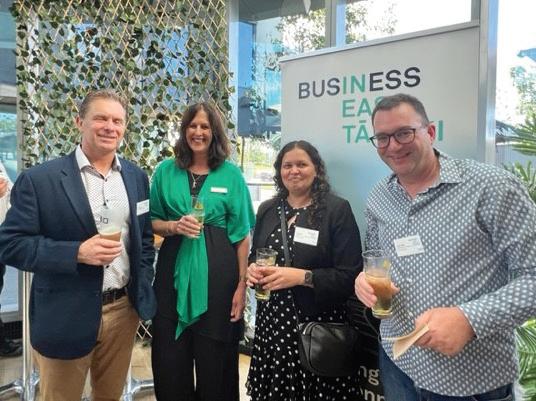
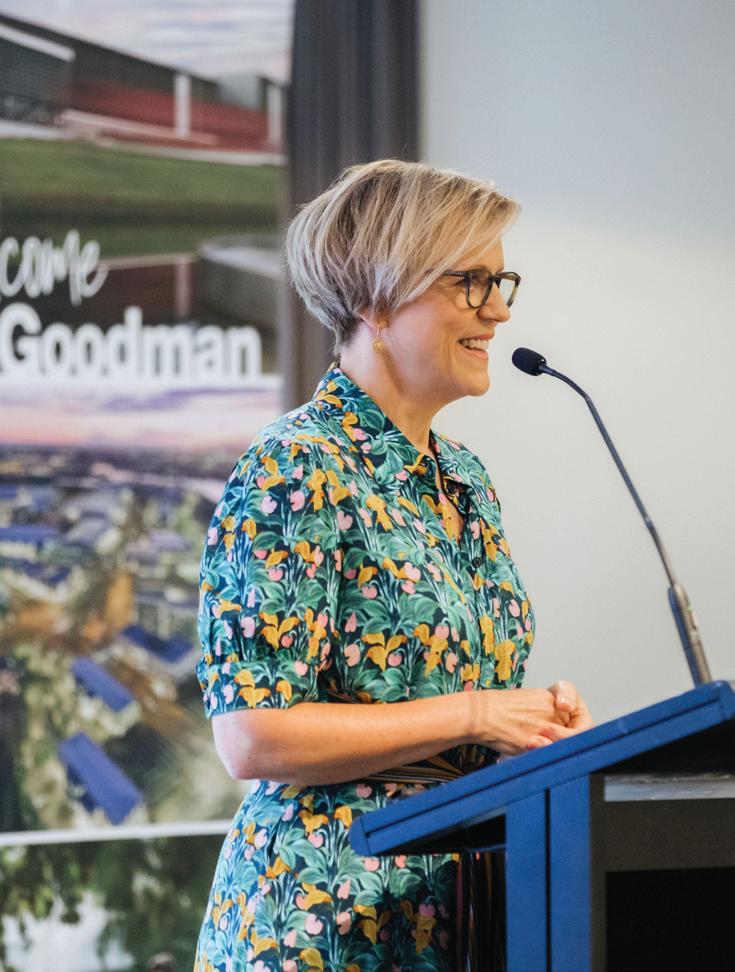

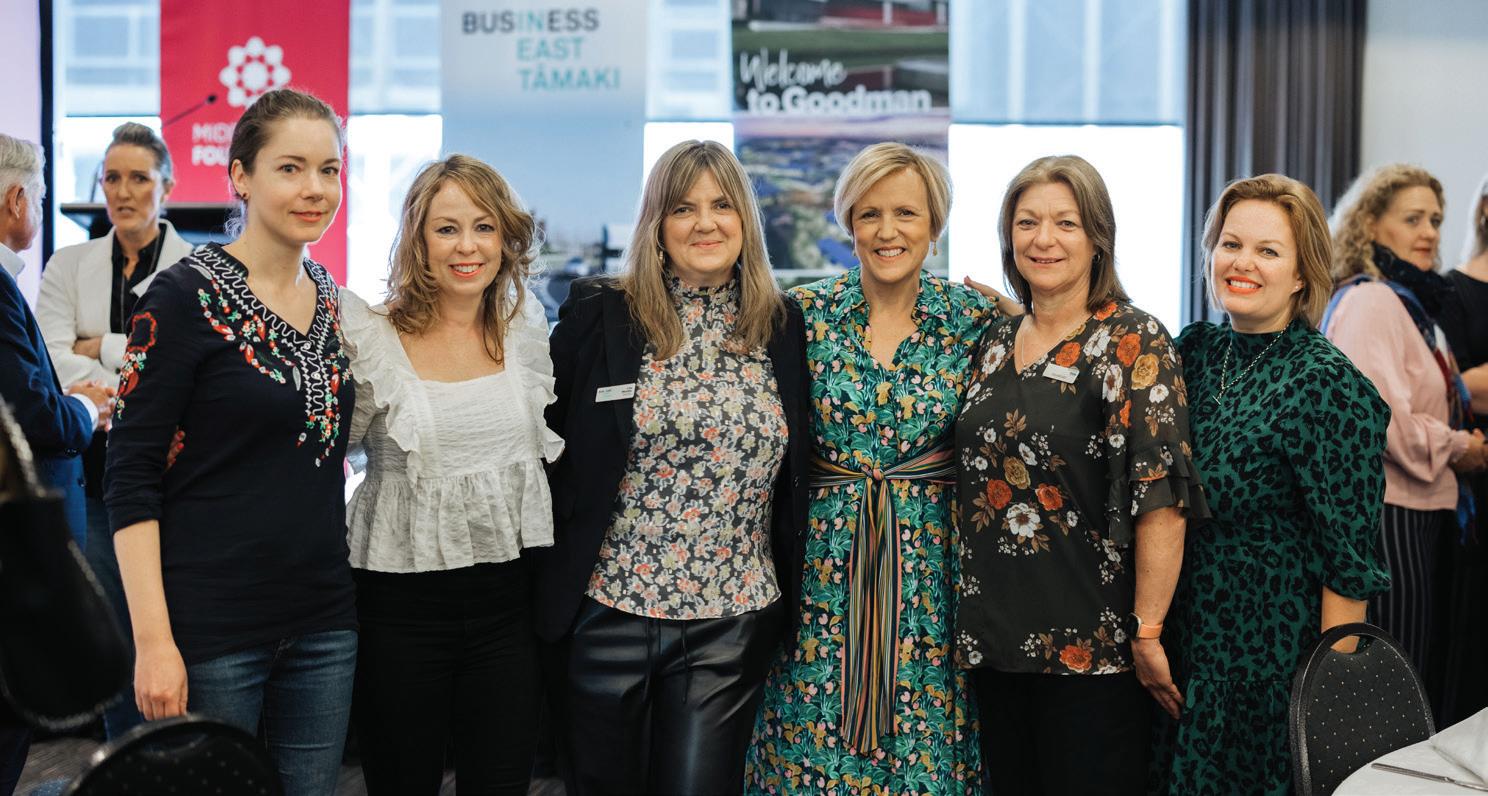
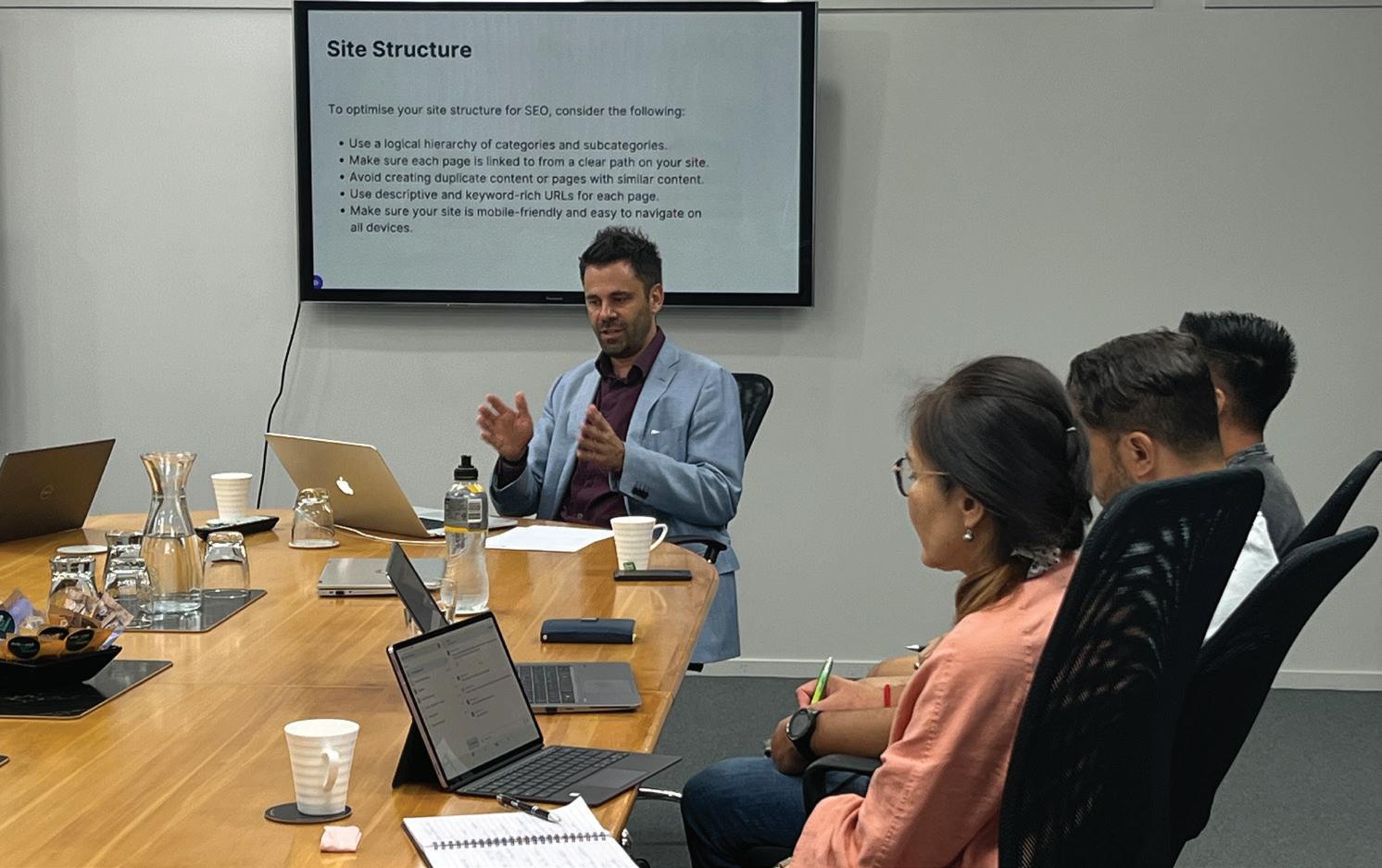
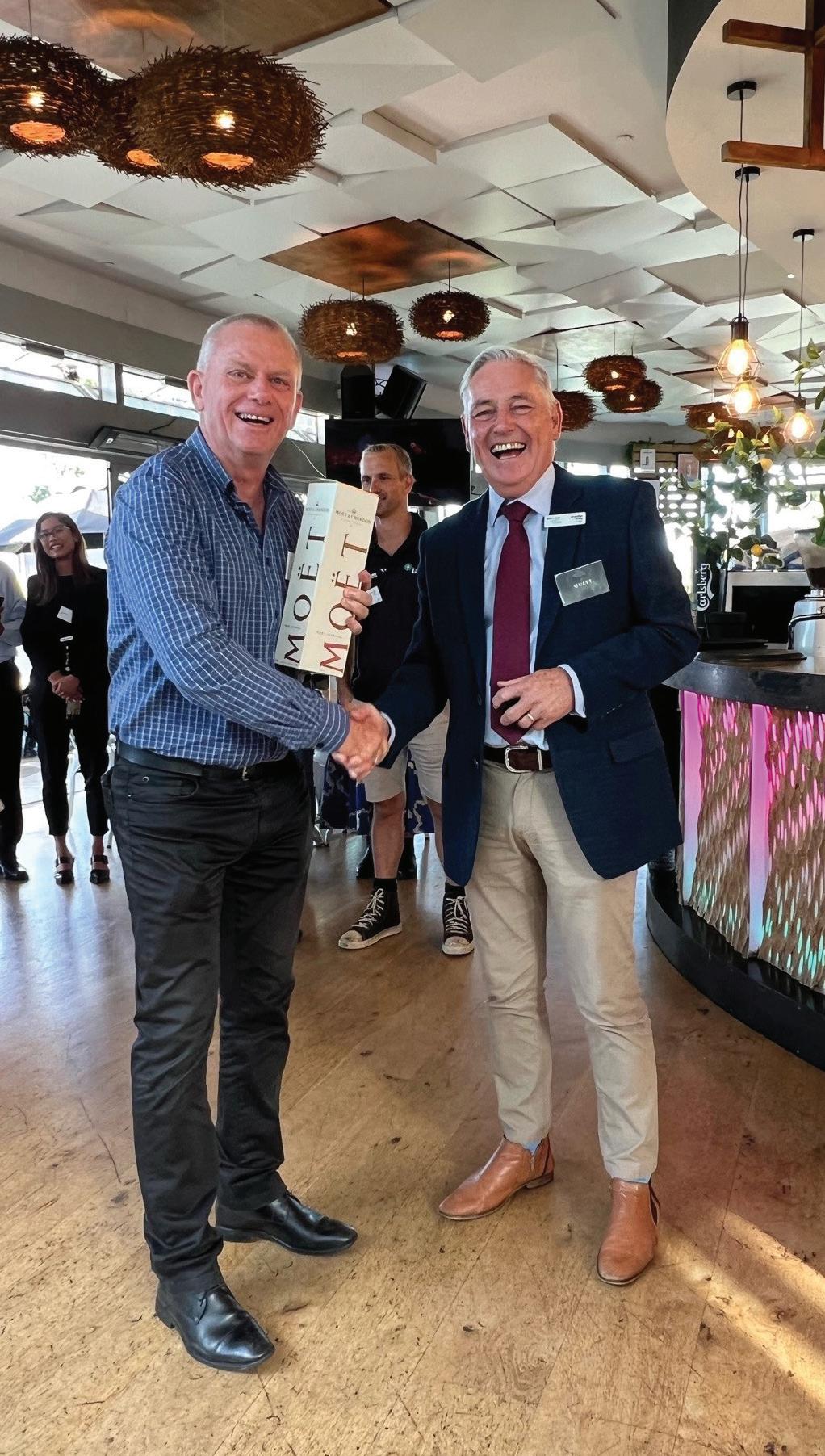
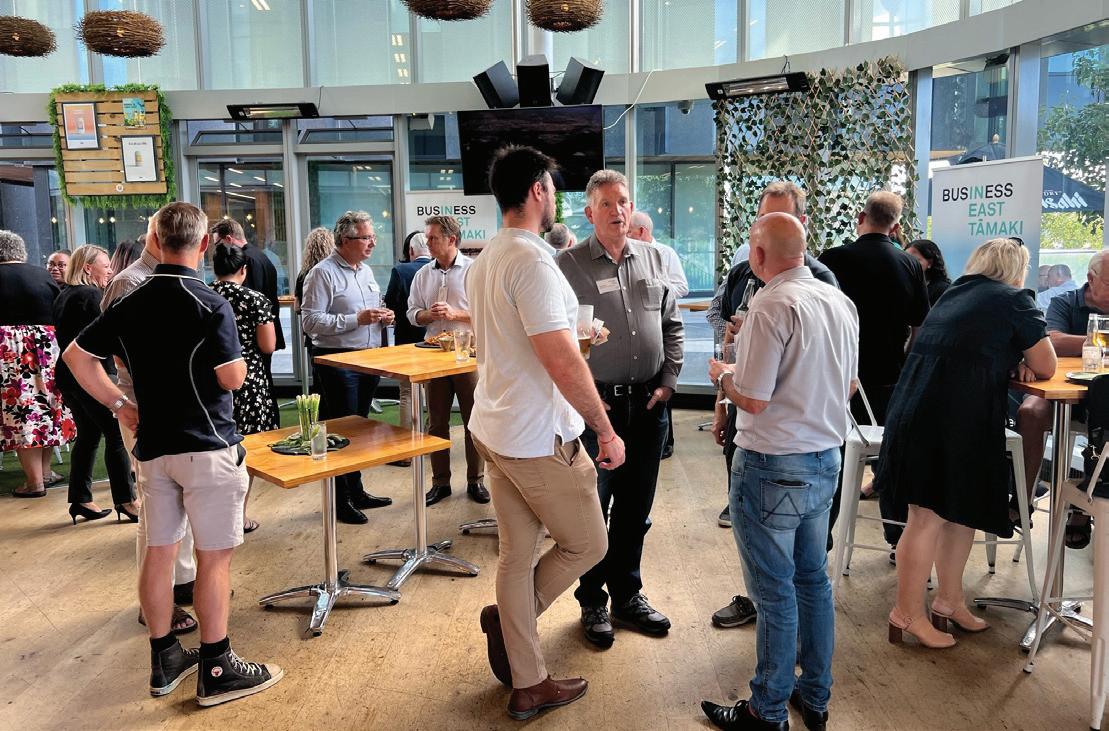
In an assessment of car-dependent commuter destinations, East Tāmaki came out top of 12 main urban centres. The destinations in the table were based upon the Statistical Area 2s (SA2s) which have the highest commuting VKT (Vehicle Kilometres Travelled) associated with them (after filtering out destinations with good public transport options –such as Auckland CBD).
This research and analysis was part of an initiative to measure accessibility – how easy is it to get to work. The work was undertaken by Ian Binnie, Performance Measures Specialist, Performance Analytics, of Waka Kotahi NZ Transport Agency, with the invaluable help of Richard Fabling at Motu (who helped establish the initial methodology).
Transport is one of New Zealand’s largest sources of greenhouse gas emissions and it’s responsible for 17% of Aotearoa New Zealand’s gross emissions. The New Zealand Emissions Reduction Plan 2022-2025, is the first step towards reducing net zero emissions of all greenhouse gases, (other than biogenic methane), by 2050.
Based on the Emissions Reduction Plan, the Decarbonising Transport Action Plan 2022-25 focuses on reducing transport emissions in three ways:
• Reducing total kilometres travelled by the light fleet (cars, vans, utes) by 20% by 2035, through improved urban form and providing better travel options, particularly in our largest cities.
• Making it easier to get around without a car.
• Increasing zero-emissions vehicles to 30% of the light fleet by 2035 for both personal and business use.
Chart notes:
https://www.motu.nz/our-research/urban-and-regional/infrastructure/measuring-commute-patterns-over-time-using-administrative-data-to-identify-where-employees-live-and-work/
The analysis and assessment of potential trips is based on data from the Integrated Data Infrastructure (IDI), a large research database used by researchers to conduct cross-sector research that provides insight into our society and economy. It holds anonymised and secure microdata, including tax data.
The IDI results are not ‘official statistics’, such as inflation or population estimates, but it’s considered a useful and accurate tool for researchers. The results do not assess what travel mode people are using, although Census data indicates 94% of people use a private road vehicle to commute into East Tāmaki (this is similar to the other areas listed in the table).
Car-dependency based upon an assessment of peak a.m. travel times of car vs PT or active modes for the average commuter arriving at each destination. Dependency defined as PT or active modes taking at least 50% more time than driving in the peak a.m. slot [although the differential was greater than 50% for most of the destinations within the table, and the differential will be accentuated for off-peak commuters such as shift workers].
On the other hand, PT is well-targeted to commuters arriving into Wellington and Auckland CBDs (PT-times comparable to drive-time)
Ian’s research, based on the IDI and Census data, also discovered the following:
• Most car-dependent commuters to East Tāmaki travel around 20 km for a return trip from home to work.
• Commuters travel mainly from the southern and eastern suburbs of Auckland and further afield; hardly any commuters come from the central Auckland Isthmus or the North Shore.
• There are little to no public transport options from these locations into East Tāmaki.
• Three quarters of the East Tāmaki workforce work in manufacturing, wholesale, transport, warehousing and construction. (Data from Statistics NZ Business Directory)
Ian says that although it was not the purpose of the report, the data puts a timely spotlight on emissions reductions. “It’s quite useful to see where a lot of car demand is being generated,” he says. “Despite heavy congestion in many urban areas, car-based commuting remains the fastest way to get to work for the majority of commuters in New Zealand.”
Business East Tāmaki in partnership with Steel & Tube, is proposing a shared transport shuttle service option to take employees from existing transport hubs to the workplace.
• The existing public transport provision is not meeting the needs of the workforce.
• Alternative transport modes such as walking and cycling are confined by limited access via major arterials where there are a large number of heavy vehicles.
• Private vehicle use is the most common means for getting to work. Until the level of public transport services increase, it will not be able to compete with the comfort of the private vehicle.

• Cost of living crisis, the cost of petrol and lack of public transport options is a deterrent for attracting employees to the area.
• The delivery of the Eastern Busway from Panmure to Botany is not due to conclude until 2026.
• Reducing congestion.
• Supplementing existing irregular and underserviced public transport options.
• Provide better value for money and a cost-effective solution.
• Environmental benefits including clean, green and space efficient travel choices.
• Access to jobs/employers, employees and opportunities.
• Success would provide a template for other business precincts to replicate.
• Area is suitable for a pilot as many employees come from areas with socioeconomic deprivation.
• Collect data via an employee survey to ascertain shift times, general location and interest.
• Confirm two potential locations for pilots of electric on-demand shuttle service to take employees from an existing transport hub to the workplace.
• Identify and prioritise locations in partnership with communities and stakeholders.
• Identify funding sources and partners.
• Identify model e.g. how we monetise the shuttle to ensure the service is sustainable.
Business East Tāmaki is currently applying for funding for this pilot. You can read more about this in our Winter issue.

Come to the TransNet NZ Limited Business Showcase - Thursday 30th March

Also speaking will be Xavier Peña, Head of Marketing APAC & New Markets, from our key supply partner, Wallbox. He’ll be covering off an overview of Wallbox and the software management system that Wallbox offer for corporate/business use.
You will also have the opportunity to see this infrastructure in use. We have AC and bi-directional DC chargers in operation as well as displays of all our chargers including the new DC fast charger (Supernova). There will be a range of EVs on site to help demonstrate how the system works.
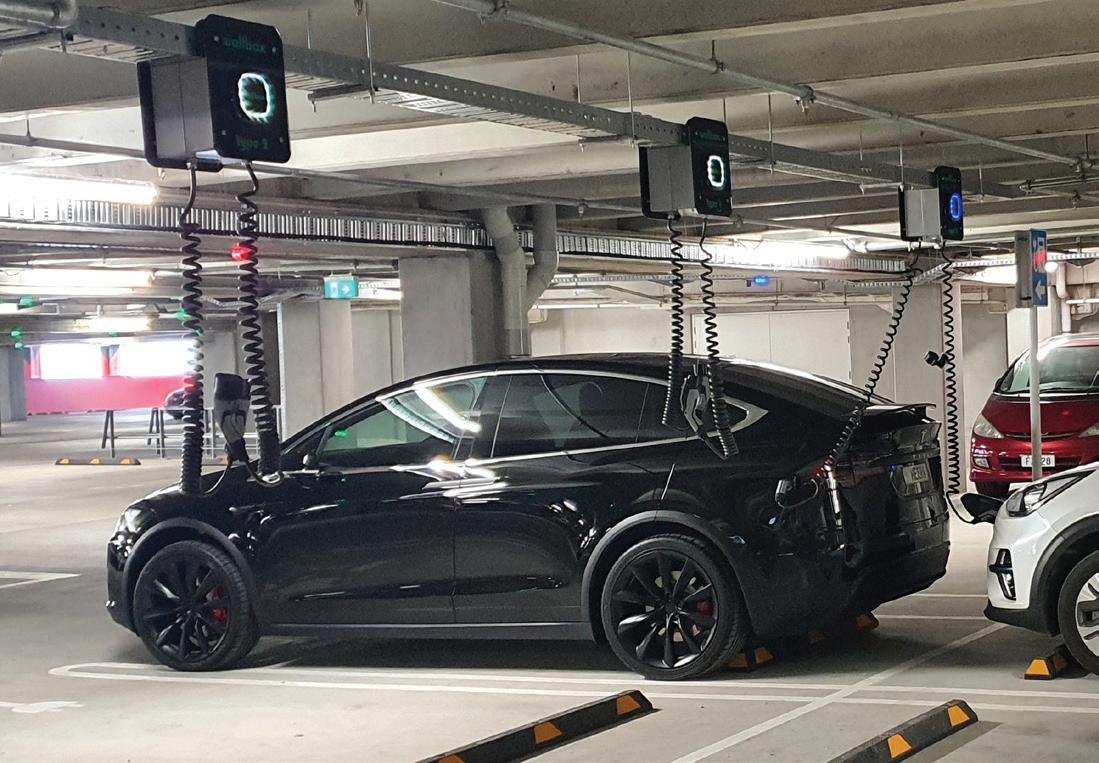
TransNet is the leading supplier to the electrical industry in New Zealand and the South Pacific. As a 100% privately owned Kiwi business with more than 22 years of experience supplying electrical components, LED lighting, and more recently EV charging infrastructure, TransNet has the expertise, experience, and the contacts to source the best products available worldwide. One of our key differences is an in-house R&D division that creates complete solutions to fill critical gaps in the market for our customers.
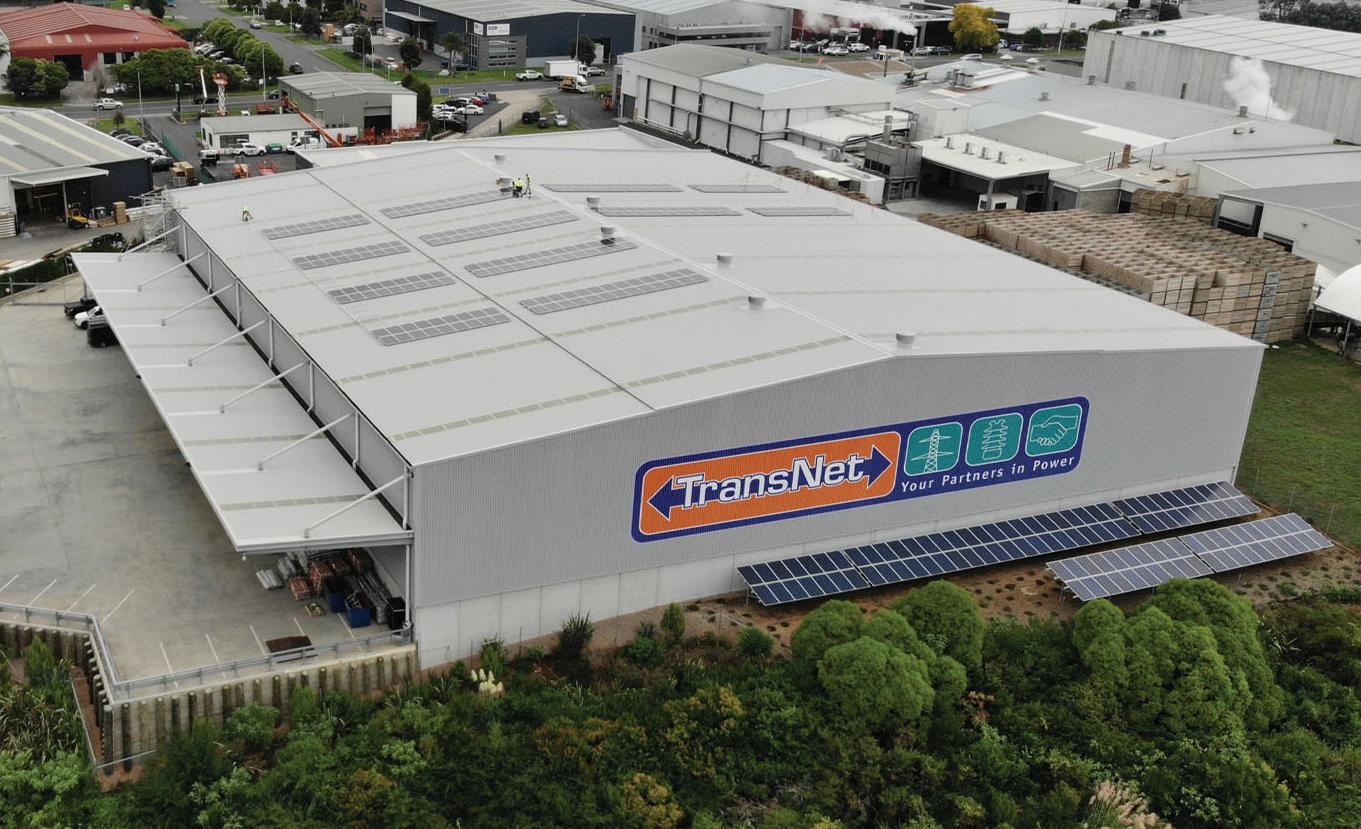
Join us for a tour of our custom-built facility, and hear from our e-Mobility Division Manager Glenn Inkster on installing EV infrastructure and EV futureproofing. This will include:
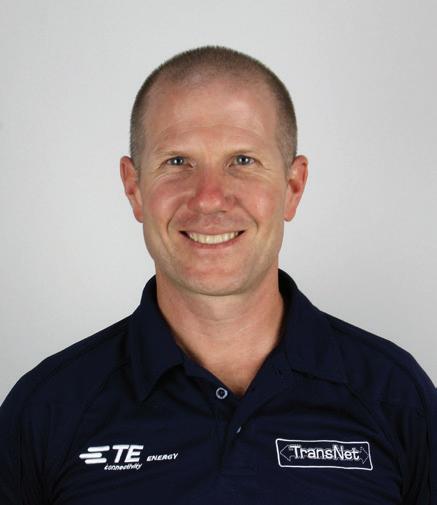

• The fundamental requirements, and issues to be aware of, when looking to move your fleet or building to EV.
• Power supply requirements and cost implications of having to upgrade supply if the wrong charge stations are chosen.
• Debunk the myths so commonly spread about EV charging.
Of course, we’ll be offering some nibbles and refreshments as well as a tour of our facility showcasing how we have incorporated a bunch of sustainable practices in our day to day operation and the integration with our EV charging infrastructure.
When: Thursday 30th March 4:30pm – 6:30pm
Where: 78 Cryers Road, East Tamaki
Refreshments: Drinks and nibbles
Carparking is available
Cost: Free

The Eastern Busway project team has found a way of recycling materials from project houses that are being removed for the busway.

Brothers Hau and Monti Eli from the Onehunga Community Recycling Centre (OCRC), have been sourcing materials from the project houses. The Elis have recovered wood, windows, doors, bricks, curtains and rails, sinks, underfloor polyester insulation, washing lines, decking, fencing and landscaping items, that are then sold through the OCRC community shop. They are giving the items a second life, and helping to cover the OCRC team’s wages.
The Eastern Busway project team has received inquiries from local people who have seen material they would like or who are looking for something particular for their own construction project.
If you’re interested in some material or would like more information, please email info@easternbusway.nz or call 0800 BUSWAY (0800 287 929). There’s a cost of $35 per hour to cover OCRC's time. The material itself is free.

Darryl and Patricia's corporate backgrounds have given them the robust marketing and business strategy skills instrumental to bringing about the change in focus and the rebrand. It hasn’t gone unnoticed, with pH7 winning Silver at the ANZ 2022 Transform Awards in Best Visual Identity from the Industrial and Basic Materials, and also being nominated as a finalist for Excellence in Strategy and Planning for the Westpac Auckland Business Awards 2022.
“Chemicals are tricky and complex,” says Darryl Burn – and he should know. He’s Managing Director of pH7, a Highbrookbased business specialising in hazardous substance safety solutions. pH7 (formerly Dalton International Ltd) was established in 1998 by his father, initially trading as a generalist safety product wholesaler. With Darryl and his wife Patricia now at the helm, the 15-strong company re-branded to pH7 in April last year, their goal to be one of the top specialist companies in hazardous substance safety solutions.
In September last year, pH7 moved into the latest, high stud, industrial building in Highbrook, which is set to be the first industrial building in New Zealand to achieve the 6 Star - Green Star certificate for environmental performance and construction.
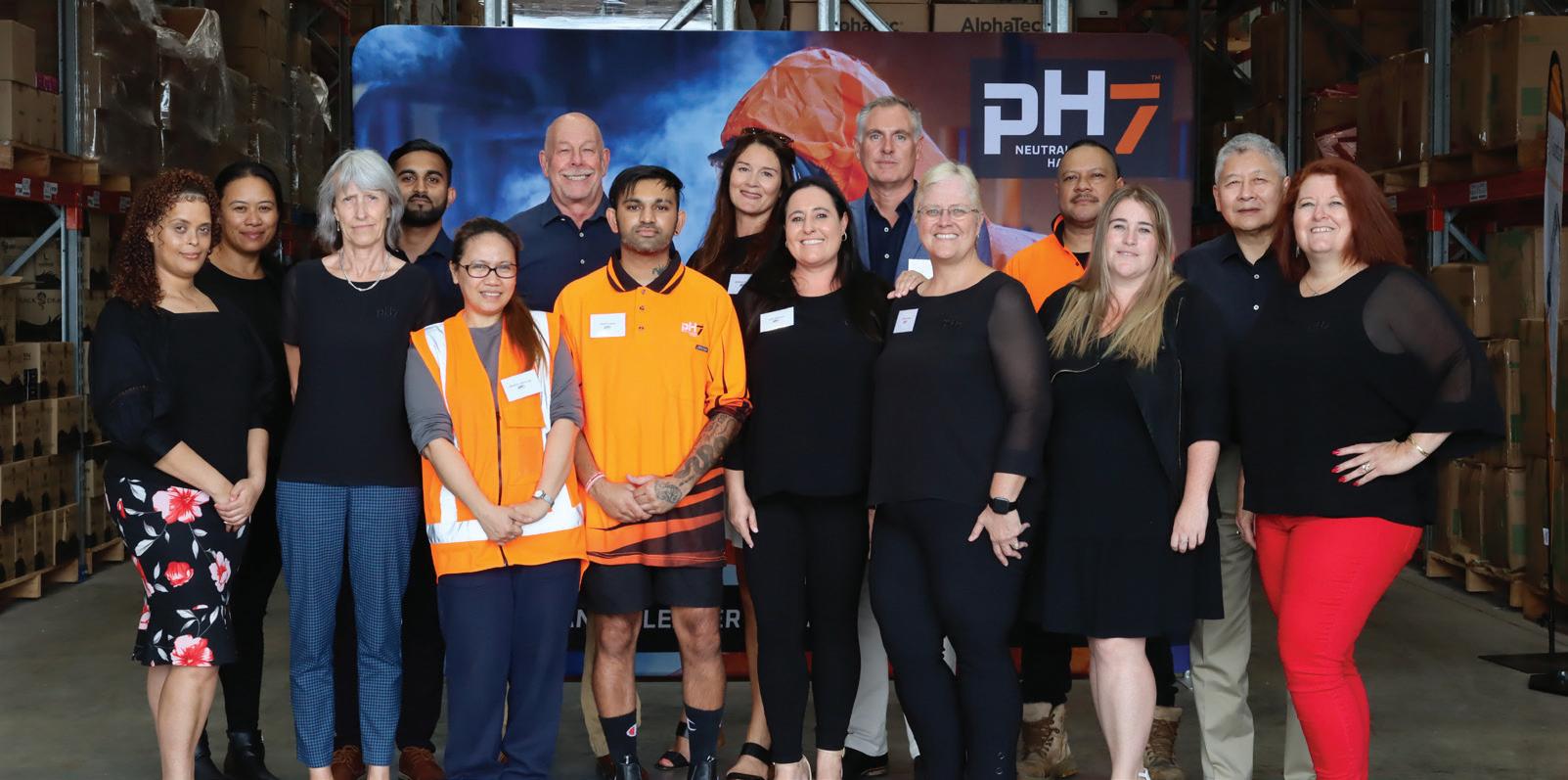
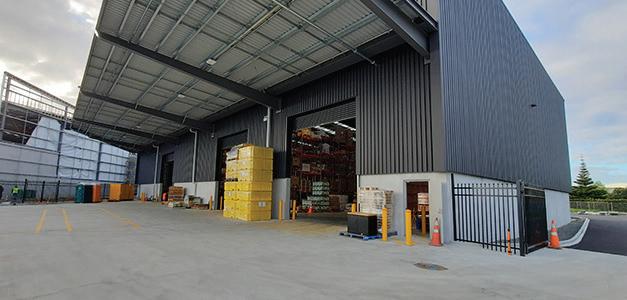

Ph7’s services
• Hazchem Storage
• Hazchem PPE
• Hazchem Response – including spill response equipment from small spills to large-scale marine spills
• Hazchem Signage
• Hazchem Services – includes respiratory fit testing, site risk reports and training
Darryl says that if all businesses adhered to compulsory health and safety regulations in the same way as compulsory tax regulations, the workplace, and our environment, would be a safer place. He says it’s mainly because most business owners are too busy to understand or attend to the confusing regulations. “So this is something pH7 does to help businesses understand.”
The safety figures are startling. Between 750 and 900 people die each year due to a workplace disease, such as lung cancer, and you’re 15 times more likely to die from a workplace disease than you are from a workplace accident. Added to that, there’s the countless spills of hazardous substances into our land and water. “The size of the problem is huge,” says Darryl.
The sustainability of the new building, which opened in February, is something that Darryl and Patricia are passionate about. “It fits really well with our personal beliefs and we’re really proud to be part of the solution,” says Darryl. He adds that the biggest issue for pH7 is still waste and packaging. “We try to do as much as we can – we want to reduce our impact.”
Goodman and their building partners have created an industrial building that uses low carbon materials, incorporates many features to offset running costs, and increase user comfort with minimal energy requirements. Any carbon emission that cannot be eliminated is offset using carbon credits. Some of the features you’ll notice at the new site include solar panels on the roof, low-E double glazing in the offices, EV charging points and movement sensor lighting in the warehouse.
Ecobags/Ecopack founder, Jaspreet Kohli, is proud that he and his wife Simran established a business way ahead of its time. “Big corporates suddenly became green. We’ve been green from when we started,” he says.
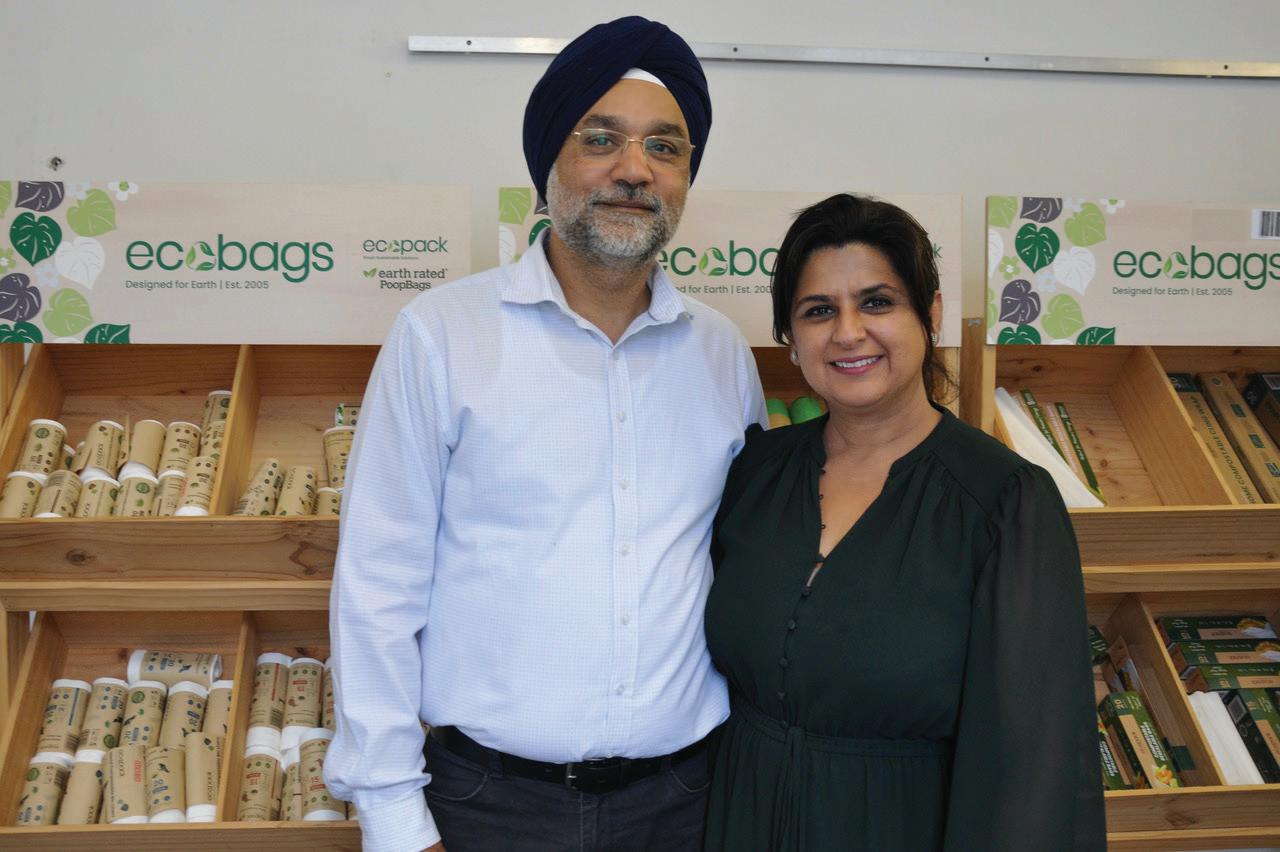
The business, which is run out of their warehouse and office space in Highbrook, comprises two main brands: Ecobags for reusable and custom branded fabric tote bags, and Ecopack for sustainable alternatives to single-use plastics. As with many enterprises, it started in their home garage a decade ago, with Jas still working at his IT job, and Simran, with a background in fabric and textiles, making cloth bags. Starting with Wellington Library’s cloth alternative to plastic bags, and expanding to other businesses in the city, in 2007 they formed a company and moved to Auckland. “Business started rolling from that point,” says Jas.
Ecopack was the first brand in New Zealand to produce compostable bags with certification. “That’s how we ended up in large supermarkets because we led the way, long before the plastic bag ban, and thats how we became dominant in the market” says Jas.
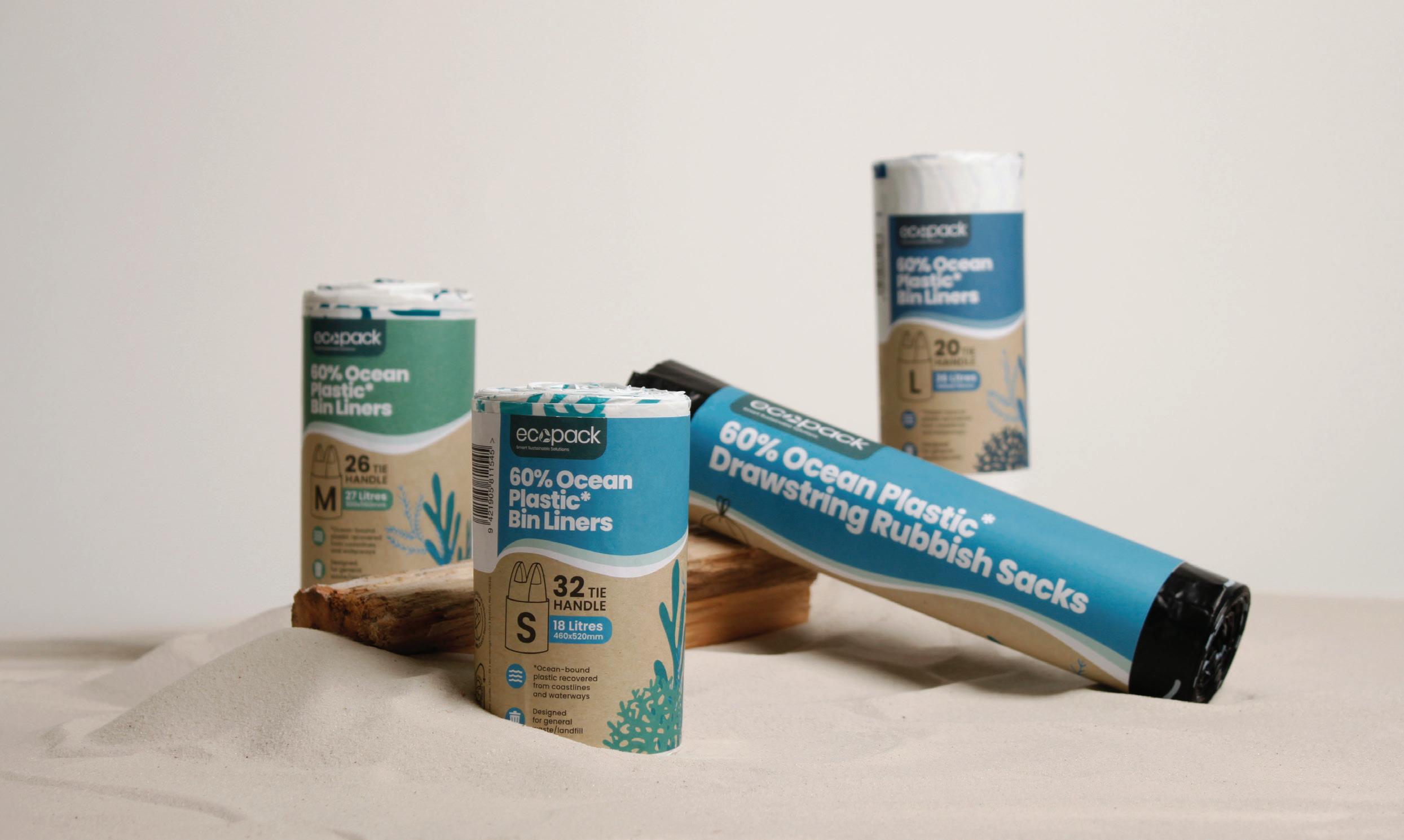
Last year Ecobags/Ecopack was named as one of New Zealand’s fastest growing companies in the Deloittes Fast 50 index. Information Resources Inc (IRI) data shows they have 55% market share in green compostable bags. Seventy percent of their Ecopack product is sold in supermarkets throughout New Zealand, the rest in retail operators such as The Warehouse and OfficeMax.
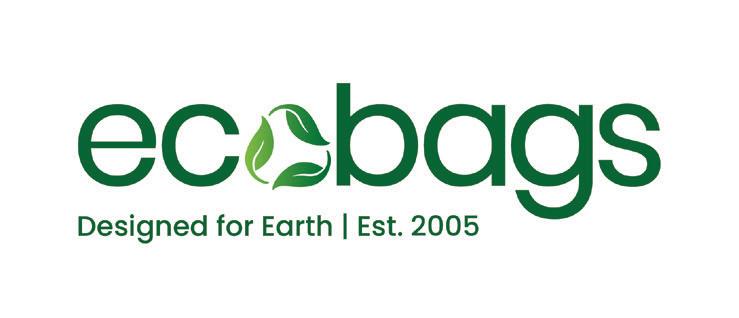
Ecopack is expanding into Australia, and already selling on the Amazon platform. “Once we get that model perfect, we can expand anywhere,” says Jas. “But we’re expanding in a very measured way. It’s taken us 13 years to go into Australia and once we’ve perfected that model we’ll expand into the US. We do want our product to be appreciated for its quality and the feel our product gives. The packaging and the design is
subtle, it’s not our name splashed everywhere. That’s the aim of the business. We’re considered and we think things through.” Their “customer-obsessed” focus is also a winner for the business. “It’s been our philosophy since we started. If it’s 100 bags or one million bags, each customer is really important.
“Buyers see our passion in our product. They’re buying the whole package, so it’s important to deliver quality and reinforce our eco-ethos at every step.”
Ecobags/Ecopack maintains a lean structure of 10 people says Jas. He explains they’ve achieved this by investing in technology to drive efficiencies and optimise business processes. “We do punch above our weight, and the lean structure helps us to survive during recessions.” He also says that research and ongoing product development are integral parts of the business that contribute to its success.
Jas and Simran are very proud of Ecopack’s latest product, made from discarded plastic waste from Indonesian shores. The waste, independently audited by SEArcular, is collected, baled up, and processed into usable recycled plastic. “Every roll of bin liners saves the equivalent of four 1L plastic bottles from ending up in our oceans,” says Jas. “They’re flying out the door.”
At Highbrook, enjoy the amenities at your door step – conference centre, gym, childcare, cafés and restaurants. With access to key arterial routes and public transport, choose a location that is easily accessible for all your staff.
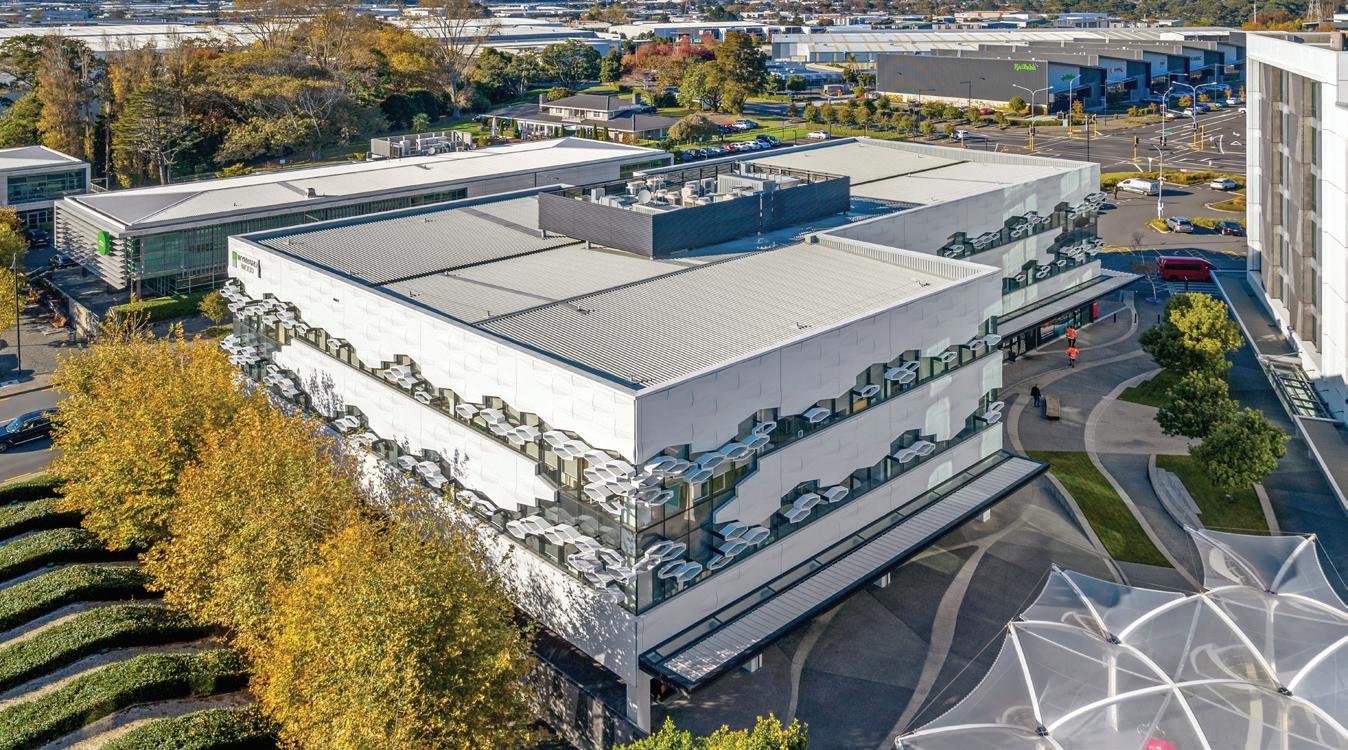
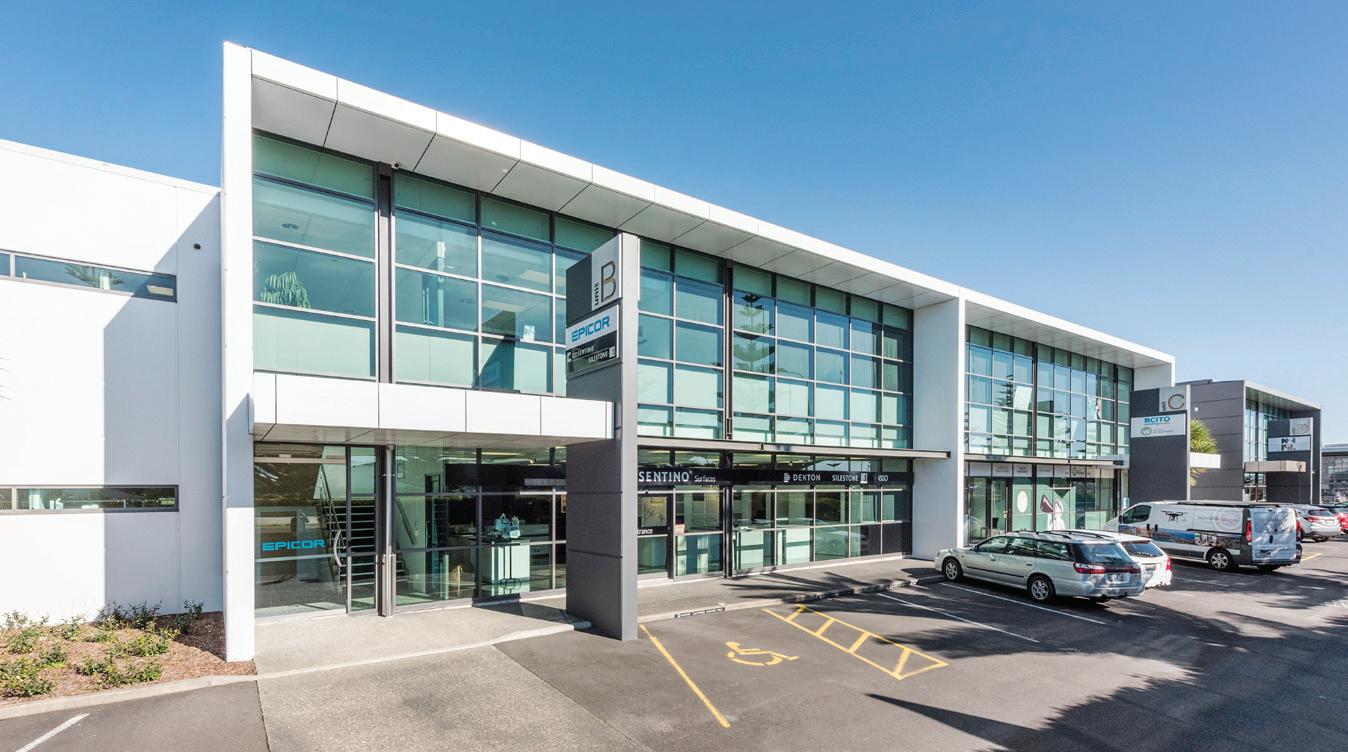
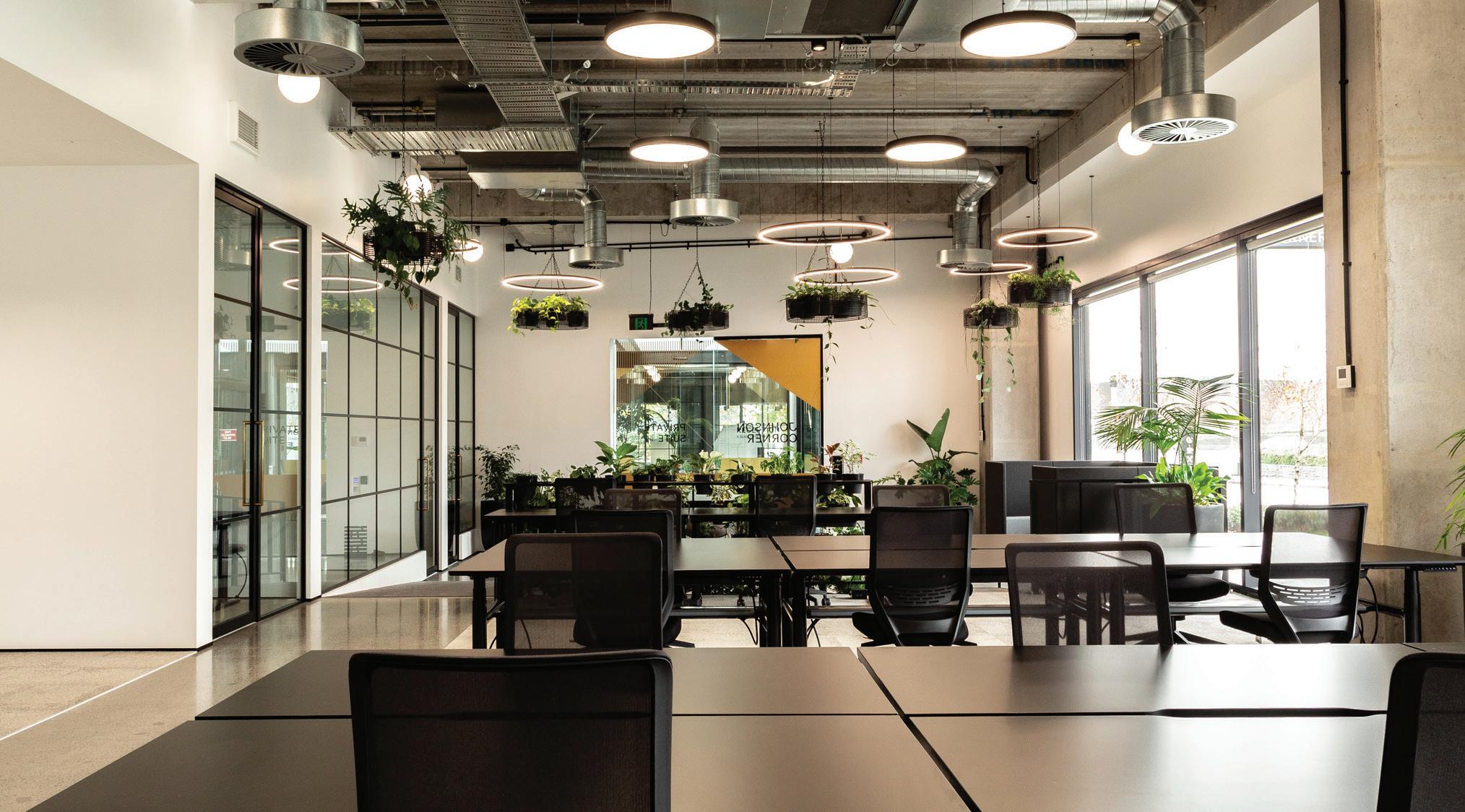
L2, Wynyard Wood House, 60 Highbrook Drive, Highbrook. 417 sqm
Robyn Barfoot. 021 428 446 Robyn.Barfoot@goodman.com
Thomas Papesch. 021 033 4267 Thomas Papesch@goodman.com
38C Highbrook Drive, Highbrook. 233 sqm
Robyn Barfoot. 021 428 446 Robyn.Barfoot@goodman.com
Thomas Papesch. 021 033 4267 Thomas Papesch@goodman.com
60 Highbrook Drive, Highbrook.
Offices from 2 person to 9 person.
Evelina Novoselvoa. 09 265 1133 evelina@johnsoncorner.co.nz
OLEA CAFE, GROUND FLOOR, OPEN COUNTRY HOUSE, 8 BUSINESS PARADE SOUTH HIGHBROOK CROSSING
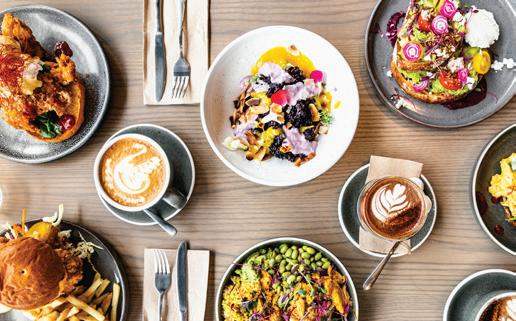

Howick-based charity, Sowers Trust, makes a huge difference to the lives of countless young people and their families, but underfunded and under-resourced, it flies under the radar, belying the impressive work that its team members and volunteers carry out on a daily basis.
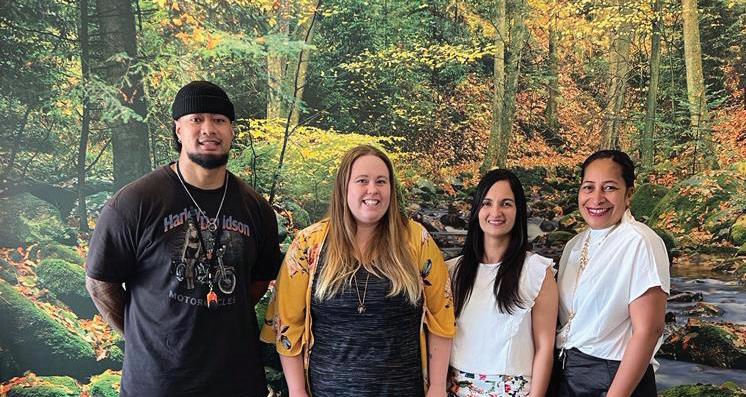
Sowers Trust is based at Howick Community Church on Picton Street in Howick’s bustling town centre. They work with young people and families in the Howick Ward (Pakuranga to Flatbush), Beachlands, Maraetai and parts of Ōtara. Originally set up as the community services arm of Howick Community Church, it was incorporated as a charity in 1988 and since then it has been providing prevention and early to mid-intervention programmes for young people, which includes youth development programmes and mentoring and support for the whole family.
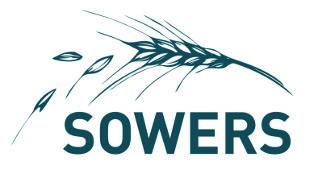
Their programmes include:
• Mentoring and youth work
This work includes life skills, self-esteem, tools and strategies to allow understanding of emotions, particularly anger and also a four-day Discovery Camp to discover their potential and begin to develop a sense of identity and self-worth. There’s also the Sow n Grow group (games, sharing sessions, boxing) for primary and secondary-aged young people.
• Social work
Social work support to families experiencing domestic violence. Advice with budgeting and parenting, together with advocacy and information, along with referral to specialist services when required.
• Triple P Parenting
Support parents and caregivers by engaging, encouraging and empowering families to address common child and adolescent social, emotional and behavioural challenges.
• Waves
Referrals primarily come from the Police (Youth Aid and Family Violence teams), Oranga Tamariki (formerly Child Youth and Family), local schools, Women’s Refuge, Whirinaki (child mental health), as well as a number of other local organisations, including STAND services, Te Rawhiti (Community Mental Health) Counselling services, CADS Altered High and Aoake Te Ra. They’re also open to self-referrals.
A grief education programme for adults bereaved by suicide. Its primary focus is to provide people with the opportunity to participate in a psycho-educational programme that offers an experience of healing and community, by connecting them with other people who have been bereaved by suicide.
“If they could see all the different work possibilities it could make a huge difference to their lives.”The Sowers Trust team - L-R Lucky (Youth Worker), Belinda Tia (Social Worker) Verona (Family Worker), and Melesina Umeano (Social Worker)
The charity has the capacity for 50 young people at any one time, either for one-on-one sessions or group sessions. There’s only four paid staff, two social workers, an occupational therapist and a youth worker. They desperately need an extra male youth worker, but funding has decreased since 2022, despite the increasing amount of youth crime in and around East Auckland and growing referrals for these young people.
“We get a lot of our referrals from Police, youth justice and schools,” says social worker, Belinda Tia. “A lot of our young people we get are truants, so we also work with truancy services.”
She says initially they work intensively with a young person, for up to three months of one-on-one, then when they’re ready, they go into group work. “We have continuous conversations with their school, their whānau, and the young person themselves. If it’s working we step back a little bit,” she says.
Belinda says it’s not just one size-fits-all. “There’s definitely not one kind of person. We might get somebody via youth justice who keeps on getting into fights, or we might get someone referred from their parents because they’re being bullied at school and suffering anxiety,” she says.
Youth crime has impacted negatively on local businesses in the community, and there's an opportunity to work together to reduce this negative impact.
Social Worker, Melesina Umeano, says there’s a number of ways the business community could get involved with the young people at Sowers. She says a lot of them don’t know what they want. “They struggle at school and they don’t see the benefits of an
education or where their qualifications can take them.” She says that they need to be encouraged to think about where they want to be in the future and what they want their life to be like. “It’s not necessarily about forming a life-goal plan but it’s about how the decisions they make now are going to affect their future.
For Sowers to continue the awesome services they have been doing for years, they are looking for partnership in the community to deliver a safe healthy working practice for both parties (staff & clients).
• Work experience at your business for a day.
• Work experience at your business for a week.
• Cleaning
Motivational speakers:
• Empowering and motivational speakers to share their own stories with the young people at group sessions.
• The Sowers’ staff are happy to come to your business and talk about what we do.
Two vans are needed to transport young people to activities, for example to local gyms, as part of their boxing programme. Help with these from the business community would be a huge boost to the programme.
If you or your business can support Sowers Trust, to find out more, email Belinda Tia - BelindaT@hcc.co.nz.
Chances are your team members’ tanks might already be running lower than you’d hope in 2023, especially after the tumultuous weather we have endured!
Wondering how to bring spring back into their step? The Highbrook Medical Mobile Health Unit is fully up and running and what’s more, they can come to your place of work. From health checks to mindfulness workshops, here are a few ways to tailor wellbeing solutions for your people.
The way we feel emotionally affects the way we think, and the actions we take. So, the first step to empowering your workforce is supporting their mental health. Take it from our Health Coach Pierre du Sart, “Teaching your workforce about how their thinking affects their body chemistry is a game changer. I like to give employees a toolkit they have ‘up their sleeve’ to help them bounce back when the going gets tough.”
By identifying health problems early, we significantly improve health outcomes. “Sometimes team members hesitate to take time off work to get a health check. But when a business sponsors health assessments onsite in the workplace, many barriers get broken down,” says Dr Jayani Kannangara. Taking care of your employees means showing them that they’re valued and their health is important to the business – physical, mental and emotional.
Catching little health problems before they become big ones is key. Highbrook’s Nursing Director, Colleen Bowring, explains: “You might be surprised to know that many people still only get medical screening when symptoms become severe. But with simple screening, we can often identify tell-tale early symptoms for early treatment. It’s a win-win strategy.”
Off the back of the pandemic and a tough flu season, the last thing we need is another infectious disease floating around. So, now is a good time for your staff to double-check if they’re up-to-date with their MMR jabs (Measle Mumps Rubella).
“The last case in New Zealand was in 2019, and you’ll recall the severity of symptoms experienced by many. Naturally, we’ll be starting Flu vaccine clinics in Autumn, so chat to our Mobile Team about booking your team a slot for us to pop into our calendar,” says Holly Higson, Workplace Health Coordinator.
After Cyclone Gabrielle, we’re all feeling hyper-vigilant about workplace injuries. No doubt you’ve been carefully reviewing health and safety after flooding and wind damage to reaffirm that sense of safety in the workplace. Touching base with your team to ensure they aren’t struggling with any injuries is another great checkpoint. “It’s really important that your employees monitor cuts or grazes that could be prone to infections like cellulitis. Similarly, if heavy lifting has been required in the clean-up or just in day-to-day work, it’s also important to monitor strains and sprains. With the opening of our Acute Clinic back at the Medical Centre, your team can now walk in for assessment close to work.” says the new Urgent Care lead, Dr Richard Chong.
We look forward to helping you give your team the unconditional wellbeing support they deserve. To find out more about booking one of our Mobile Health Services, contact Holly Higson. Email: Holly@highbrookmedical.co.nz
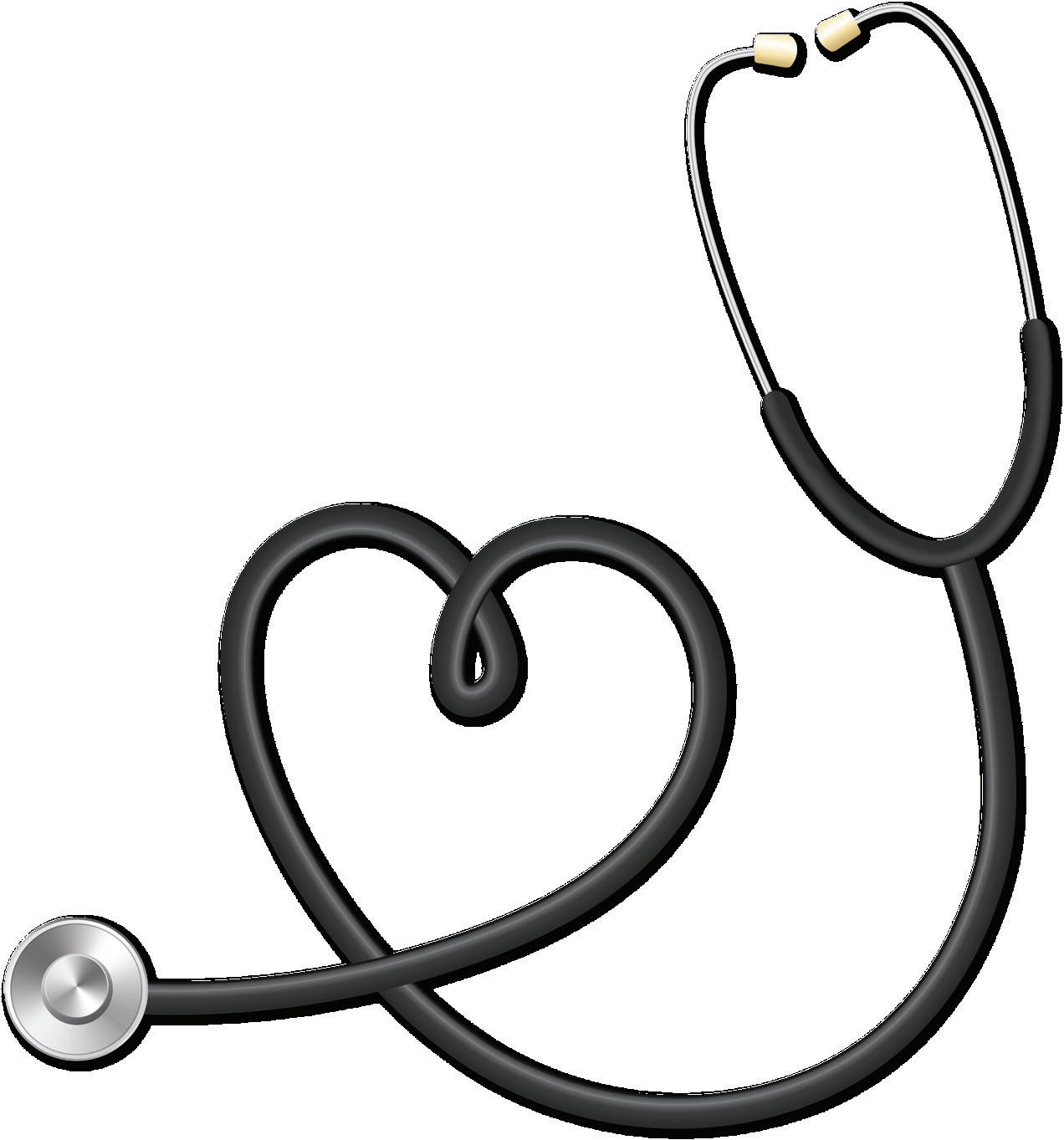
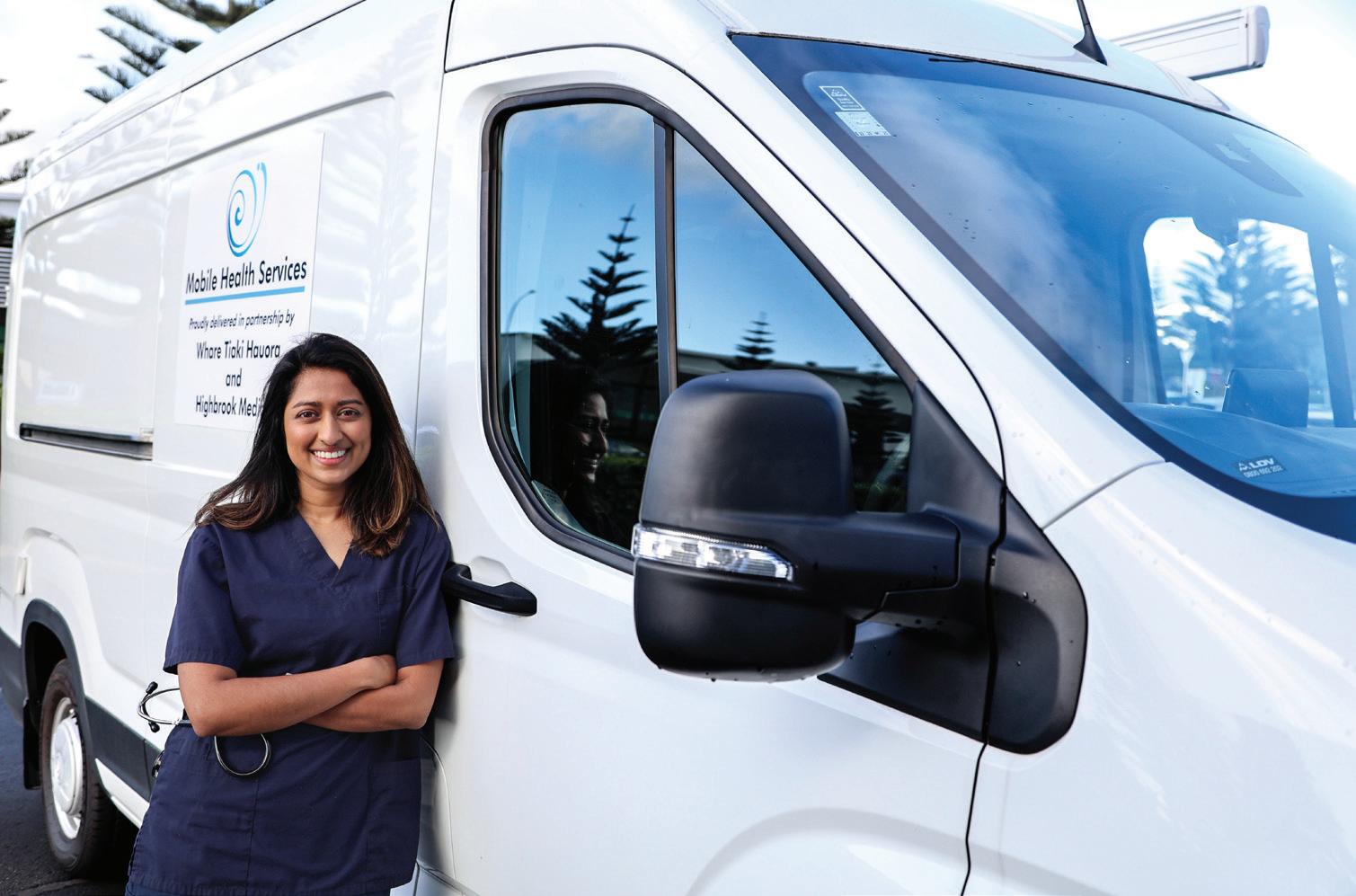
New Zealanders are known for our ‘DIY’ attitude the world over. This is how we begin our entrepreneurship journey, and it serves us well, but there’s a point in time when all business owners need to consider the value of a strategic partnership to unlock their growth potential.
My advice for ambitious New Zealand businesses ready for step-change growth in 2023 is to think seriously about Private Capital investment. Yes, economic conditions are challenging, but this is exactly why a Private Capital partnership may be well-timed.
New Zealand companies turned global success stories such as Xero, TradeMe, Rocket Lab, and Vend have all leaned into Private Capital, but it’s not just for the elite few.
It would not be overstating matters to say that Private Capital hit new heights in the last 12 months, and that figure is set to rise. According to The New Zealand Private Capital Monitor produced by EY, Private Capital is at record levels. The total Private Capital injection into New Zealand business increased to $4.3b in 2021, up from $2.5b in 2020. Early-stage venture capital activity alone was up 3.9 times on the prior year, to $495.2m.
The pandemic has undoubtedly accelerated this, with investment pouring into both the innovations and the efforts to bolster competitiveness in existing businesses.
Add to this Immigration New Zealand’s new Active Investor Policy, introduced this year to attract high-value investors bringing growth opportunities to New Zealand businesses, and the conditions couldn’t be better for Private Capital growth.
At BNZ, we connect businesses with the right professionals to help them become investment-ready and, when the time is right, introduce them to investors looking for opportunities. I know from talking with investors, both here and around the world, that the desire to invest in New Zealand is strong.
Whether New Zealand businesses are wanting to launch into new markets, or expand their local customer base, the combination of funding and expertise can be a game-changer. What business doesn’t want a strong balance sheet, great knowledge, valuable networks, and experience? And with so many Private Capital opportunities on offer, I’m excited to see the future impact of this investment here in New Zealand, for both businesses and the economy on the whole.
What do businesses need to know? Here are my top five tips:
1. Clearly articulate your step-change growth plan.
Professionally prepared financial statements and forecasts, ensure your IP is appropriately secured, and that you have a clear strategic plan.
2. The right fit is key.
Research the provider of the Private Capital and make sure your risk appetites are aligned, especially if you’re going to need further follow-on capital in the future.
3. Plan for changing economic conditions.
There are also challenging times ahead with inflationary pressure top of the list. When developing your business growth plan, factor in all conditions.
4. Get independent expert advice.
Surround yourself with experienced professionals to guide you through the process.
5. Be clear on the scope of the relationship.
Are you looking for governance, connections, knowledge, and experience?
This article is solely for information purposes. It’s not financial or other professional advice. For help, please contact BNZ or your professional adviser. No party, including BNZ, is liable for direct or indirect loss or damage resulting from the content of this article. Any opinions in this article are not necessarily shared by BNZ or anyone else.
How could the investor support your broader business goals?
Counties Manukau East Area Prevention Manager, Rakana (Raks) Cook, says vehicle crime, thefts and illegal street racing continue to take place in the area. But he says that Police are increasingly using an intelligence and evidence-based approach to preventing these crimes in the first place. “It’s proactive, not reactive,” he says. “I feel hopeful about the data that’s coming through from various platforms. We have a better understanding of trends; the timeframes they occur and which locations. Intelligence-led initiatives are the best way to deal with a range of issues in our community.”
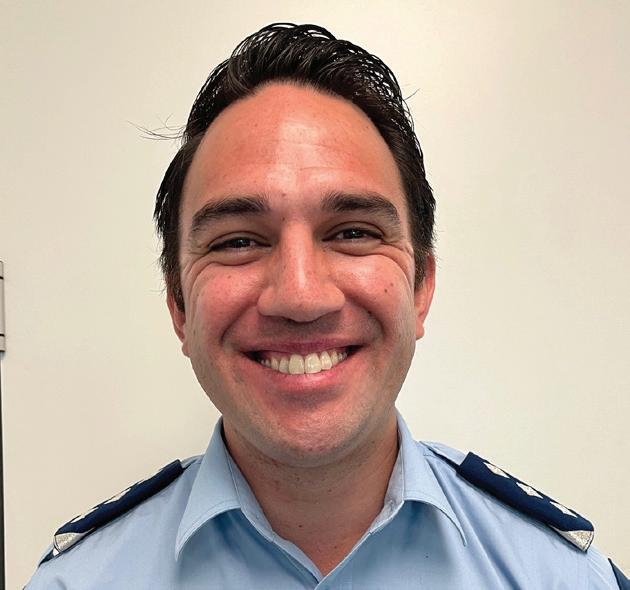
Always call 105 for non emergencies or if it is occurring in front of you call 111, this includes if your car has been stolen, or you see a crime being committed or suspicious activity. The reports are entered into our data system and collated, so we can see trends, link incidents and from that information look to reduce crime occurring or continuing.
“Rest assured that our teams in Counties Manukau East are actively being visible in the area and we are committed to keeping our community safe.
“It’s not a magic wand but it’s a start,” says Raks.
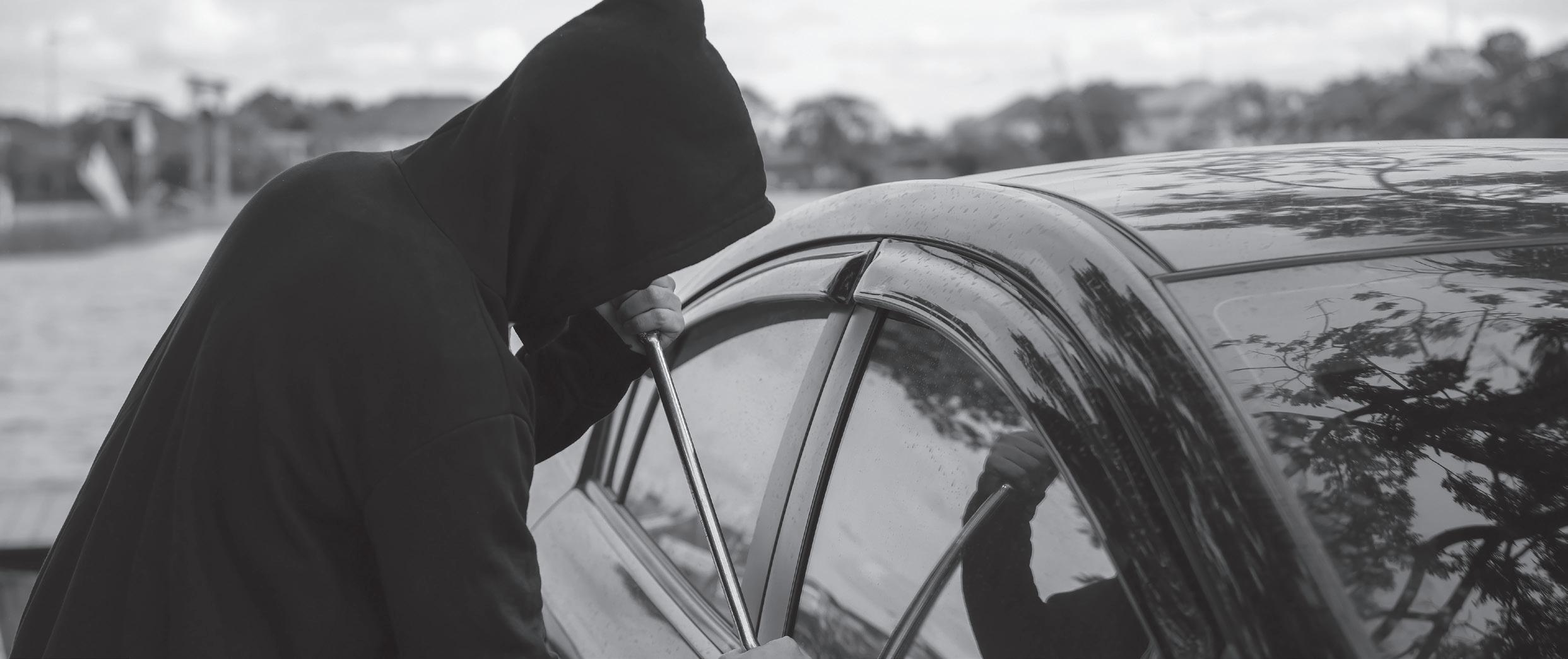
“Looking at data over the last six to nine months, we can see trends, repeat locations and the most targeted vehicles,” says Raks. In some cases, vehicles are unlocked and valuable items are left in plain sight. This is when opportunity presents itself and this is when offences can occur.
This is across the whole region, not just East Tāmaki. Be mindful, before you lock and leave the car, if you have anything in plain view like bags, coins, cigarettes, sunglasses, it will tempt someone. Put them out of sight in your glovebox or under the seat. “Even coins can tempt. It doesn’t matter if it’s only $1.50, that small amount can be seen as valuable to someone and the probability of it being taken is high,” he says. “When I’ve been on patrol, I can see phones and bags on the seats, car windows left open. I know life is busy, but I ask our community to keep this at the front of your mind to lock up and put everything away.”
Update from Inspector Rakana Cook, Area Prevention Manager for Counties Manukau East“We are working on preventative initiatives, working with our partners, across all sectors, to make vehicle crime and thefts least desirable and as difficult as possible.”
At a meeting in December last year, Howick Local Board approved a 24/7 Alcohol Ban for the Highbrook Boat Ramp, car park and adjacent grassed area as shown in the map. Business East Tāmaki presented and spoke in support of applications from New Zealand Police, Goodman and Metro Performance Glass.
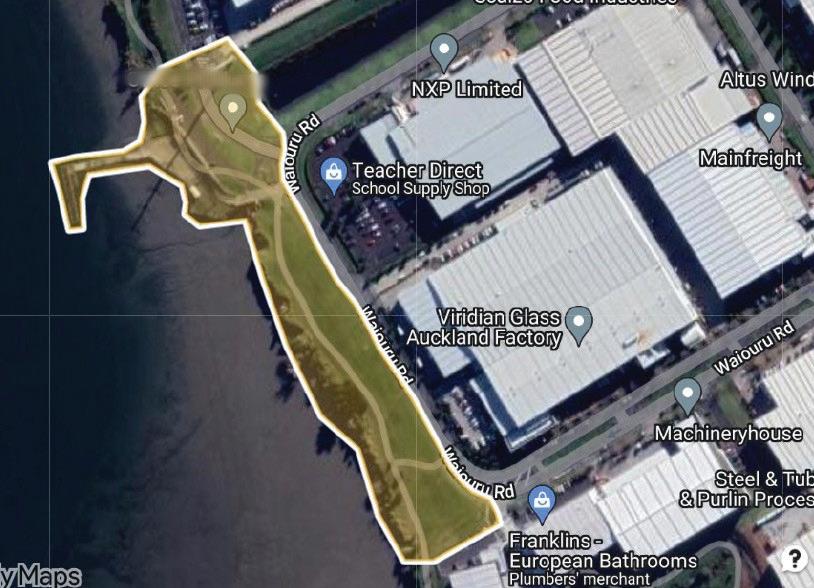
This area has a long history of being frequented by large numbers of people resulting in undesirable activities and putting at risk the safety of employees and business premises. The Local Board’s decision is a significant win for nearby businesses, and we appreciate their deliberations that led to this outcome.
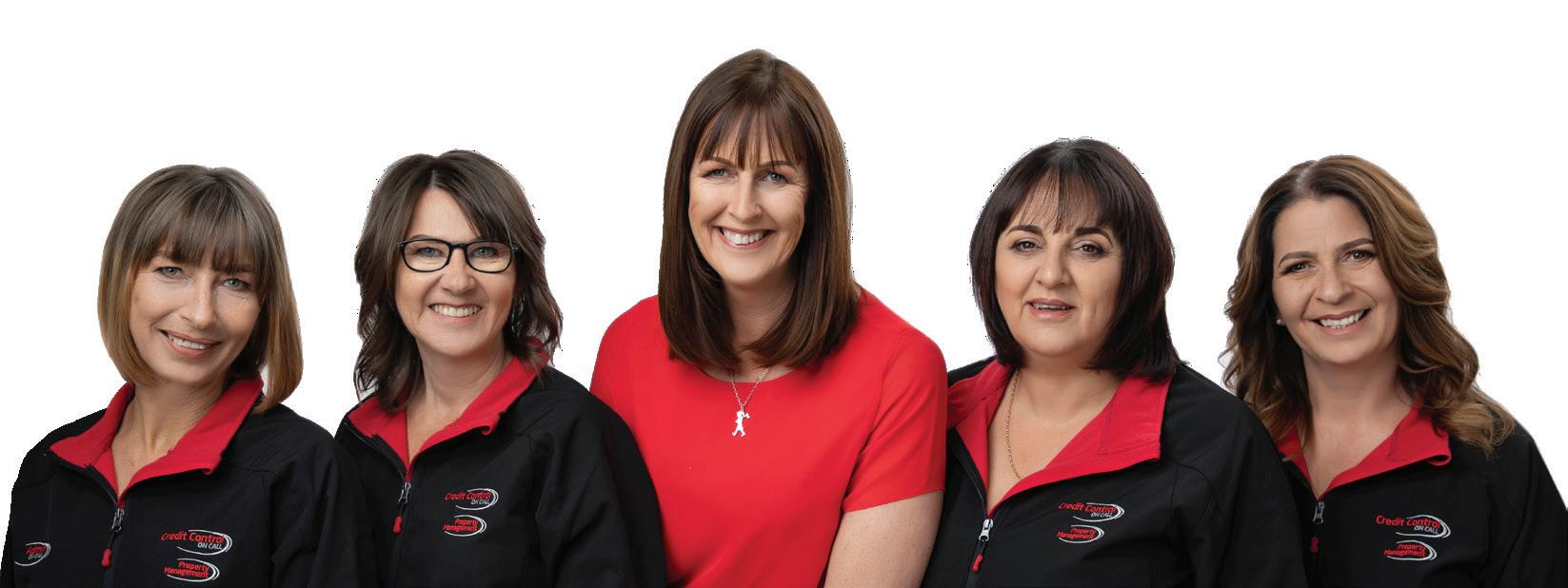
An alcohol ban provides Police with a clear tool for dealing with minor infringements in these cases. Police can use an alcohol ban to disperse groups, although they have described an alcohol ban as being just one part of an effective response to reducing incidents of disorder in the area.

Additional actions that have already been taken include installing a gate and bollards at the carpark in mid-October 2022 (to block cars from driving from the street, over grass and onto the carpark), using CCTV,
and regular security patrols who inform the police if an incident is occurring. The existing vehicle prohibition only applies on roads from 10pm to midnight and excludes vehicles with a legitimate reason to be in the area (for example workers or patrol officers). Additional lighting for the car park is also being investigated by Goodman Property Trust.
The Ministry of Social Development has a new team focused on assisting working New Zealanders.
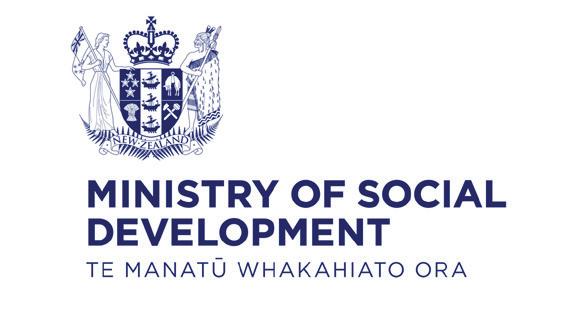
The Early Response Team is a dedicated team which is responsible for delivering Redeployment Support. This involves identifying and supporting people who are disadvantaged in the labour market, to retain their employment, or transition to new, good and appropriate employment, or upskilling opportunities.
This initiative is set up to provide access to a range of services that employers and their employees can utilise. The team gets out into the community, tailoring support to meet employers and employees’ requirements and needs.
The team has two core functions:
• Delivering prompt tailored support for people at risk of job displacement.
• Gathering intel and opportunities to enable effective early intervention
The Early Response team is one part of a broader ecosystem of support, services, and opportunities for people at risk of job displacement. They work collectively to build relationships and partnerships with stakeholders, to collaboratively identify opportunities to enable effective early intervention, develop and deliver services, tailored to people’s needs. The team are mobile within their region to respond to job displacement where it occurs.
If workers need help with essential costs, we may be able to help. You don’t need to be on a benefIt to access an eligibility check, we have some assistance options available to workers on lower wages or those who have had their work hours limited (see above).
Workers and their employers may be interested in upskilling opportunities to increase skills in the workplace. We provide access to a range of MSD services:
• Flexi-wage support to retain and re-skill employees
• Mana in Mahi funding for those interested in an apprenticeship
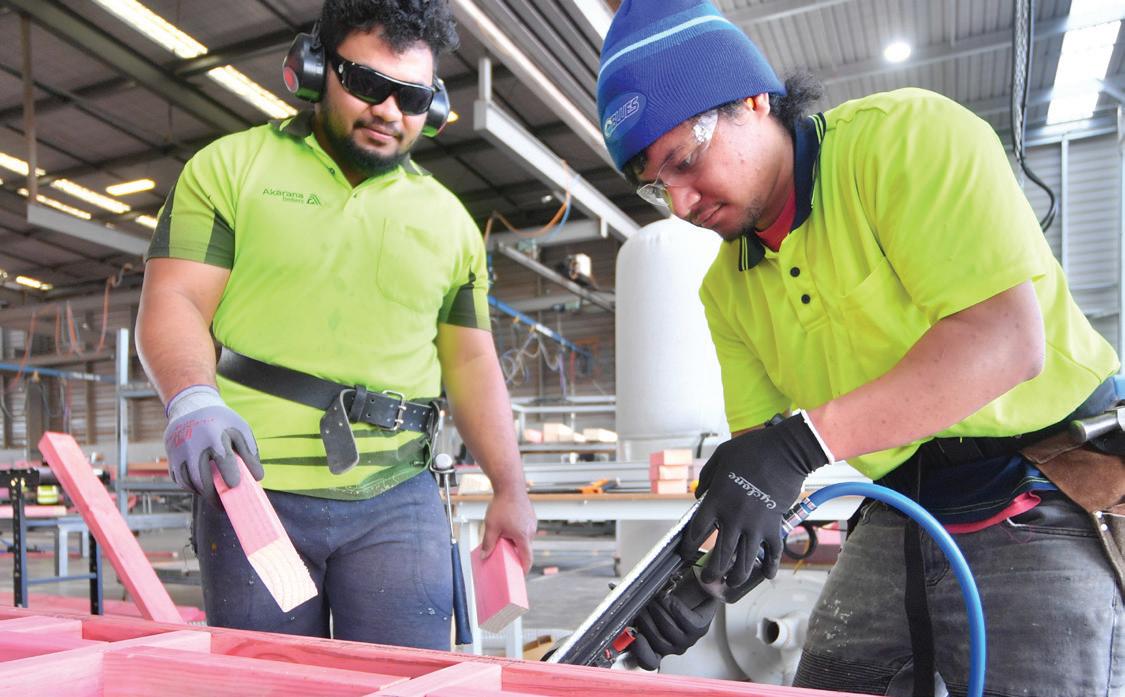
Some tertiary institutes have reduced or waived their fees and some courses are available online:
• Workplace Literacy and Numeracy (WLN)
• Fees Free
This service utilises a proactive approach with employers, focusing on how MSD can be involved earlier to help people at risk of job loss. We are able to tailor support to meet employers and employees requirements and needs:
• Connecting staff at risk of job loss directly to other employment
• CVs and career advice
This service utilises a proactive approach with employers, focusing on how MSD can be involved earlier to help support their employees with additional financial assistance. By being involved early, we aim to reduce the number of people falling into hardship, and those who may be struggling due to their financial commitments or working less hours due to personal reasons. The financial support they can help with includes the accommodation supplement, food grants, travel costs, dental work and car repairs.
Eligibility is accessed via a direct link to our team or with our representative on site.
Co-Location: MSD can provide a Case Manager from our team for your site to assist your staff through this process.
• Job expos to link directly with employers
To find out more about how we can help you: Auckland_Early_Response@msd.govt.nz
Has your business thought of offering internship opportunities to MIT – Te Pūkenga students? It’s a great way to help develop talented locals while introducing different perspectives and skills to your workplace.
Irshad Ali is a director of Transparent Digital Media, an online marketing agency, based in Springs Road. The fast-growing company founded two years ago specializes in social media advertising and has recently moved towards content production.
“MIT reached out to me. We hadn’t worked with interns before and we said let’s take one on board and see what happens,” he says.
Manukau Institute of Technology School of Business connected Transparent with Caitlin Puffy, a final year student in the Bachelor of Applied Management programme majoring in project management.

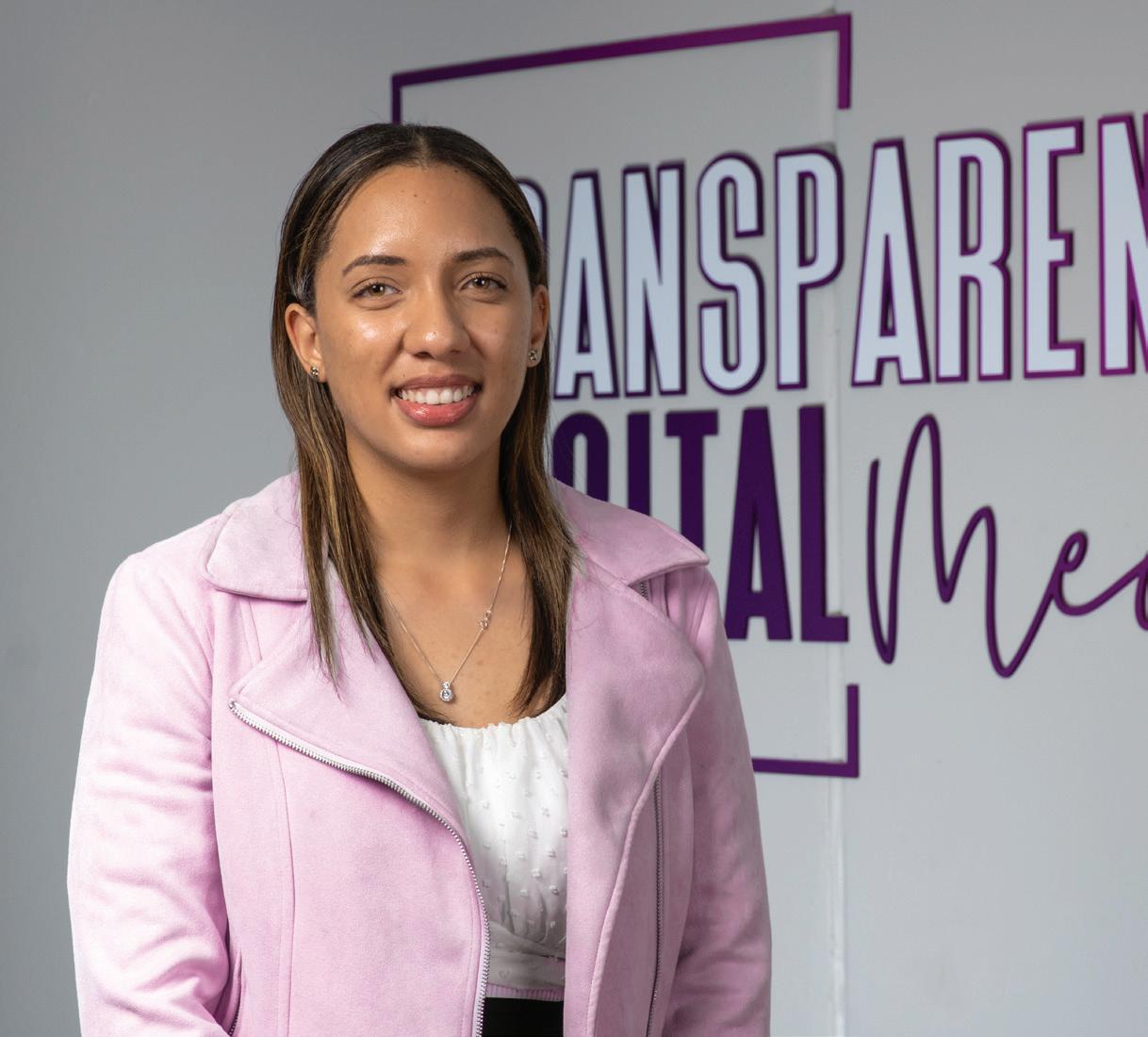
The placement allowed the 22-year-old Manukau resident to complete an industry project that is part of her qualification while helping the company get a new platform aimed at the property market off the ground.
“When I started the internship, I was coordinating the new Property Reels. It offers a videography and photography agency for estate agents,” Caitlin explains.
“They can get their social media up to standard, get their listing on the website, a profile and badges will unlock perks for them,” she says.
The firm was impressed enough with what Caitlin achieved that she is now a fulltime,
permanent part of their eight-strong team.
“She’s still working on Property Reels,” says Mr Ali. “Now we’ve started putting more resources behind it and hope to have a launch function in a couple of months. We’ve got lots of different clients. She’s now in a co-ordinator role acting as a bridge between the clients and our services.”
When you provide a placement opportunity to an MIT student, they are supervised by one of our team of experienced lecturers who oversee their industry project.
Business School senior lecturer Tania Parker met up with Caitlin once a week to discuss how she was applying the skills she had learned in class to the workplace.
“Caitlin’s project went really well. She was easy to supervise. You’re getting local people,” Ms Parker says of the benefits to companies in placing students. “They know current practices. They have a wide skillset. Our learners allow a business to think outside the box more.”
Irshad Ali believes supportive workplaces with the time to really develop their graduates into the employees of the future get the best results.
“You have to set the right expectations,” he says. “Caitlin was eager to work but she
needed the guidance. I shared the vision of what we were wanting to achieve. She was motivated. Eager to learn. Put her hand up.”
MIT has been serving the region for more than 50 years and recently joined Te Pūkenga, a nationwide network providing vocational education which represents the country’s largest tertiary institution.
If you’re interested in finding out more, contact Recruitment Consultant, Maureen Prasad at Employmentsolutions@ manukau.ac.nz
On average, every year, each New Zealander sends about 750kgs of waste to landfill. The ban on single-use plastic bags in 2019 has meant more than one billion fewer plastic bags have ended up in landfills or the ocean. In October last year, the first group of the most problematic plastic products was banned in a progressive phase-out over the next three years. In July this year, the next group of single-use plastics to be phased out will include single use plastic plates, bowls, cutlery, single-use plastic produce bags and non-compostable produce labels. Other PVC and polystyrene food and beverage packaging will be banned from mid-2025.
Plastic is one of our greatest environmental challenges. It regularly ends up as waste in our landfills, our moana and whenua. Hardto-recycle packaging and products can interfere with our recycling systems and are often used only once before being disposed of.
Shifting away from hard-to-recycle and single-use plastics will help reduce plastic waste, improve our recycling systems and protect our environment. This shift is also part of a wider ambition to move Aotearoa New Zealand towards a low-emissions, low-waste economy.
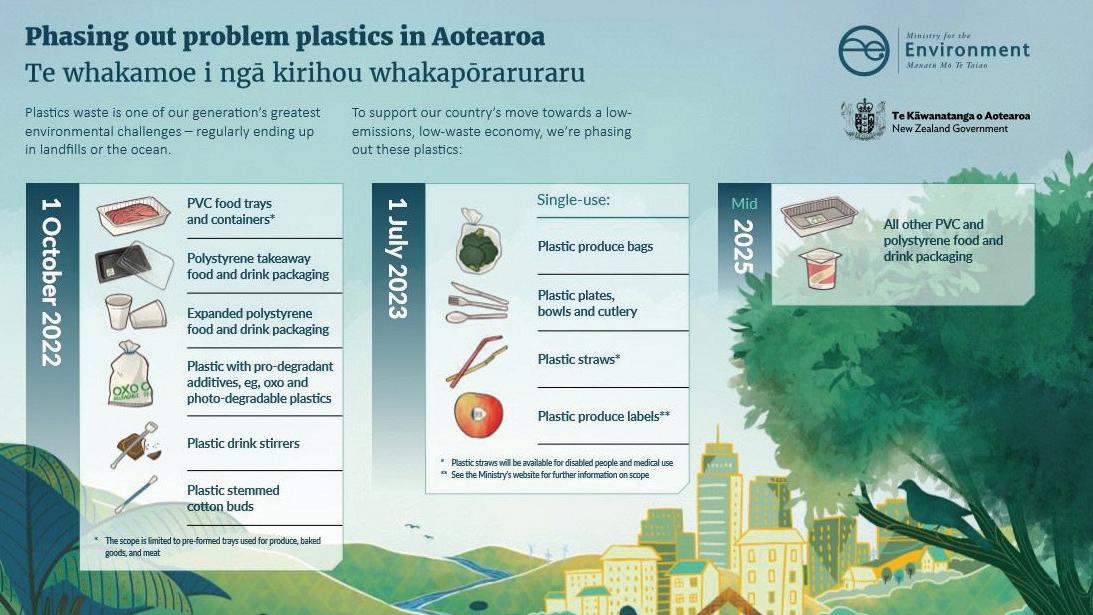
• PVC food trays and containers* (plastic type #3)
• Polystyrene takeaway food and drink packaging (plastic type #6)
• Expanded polystyrene food and drink packaging (plastic type #6)
• Plastic with pro-degradant additives, eg oxo and photo degradable plastics (subset of plastic type #7)


• Plastic drink stirrers (all plastic types)
• Plastic stemmed cotton buds (all plastic types)
• Produce bags* used to pack fresh fruits and vegetables
• Plates, bowls and cutlery
• *Straws***
• Plastic produce labels must be replaced with more compostable alternatives.
*Not including bags for pre-packed produce (eg, bags of potatoes or spinach and sleeves for leafy greens).
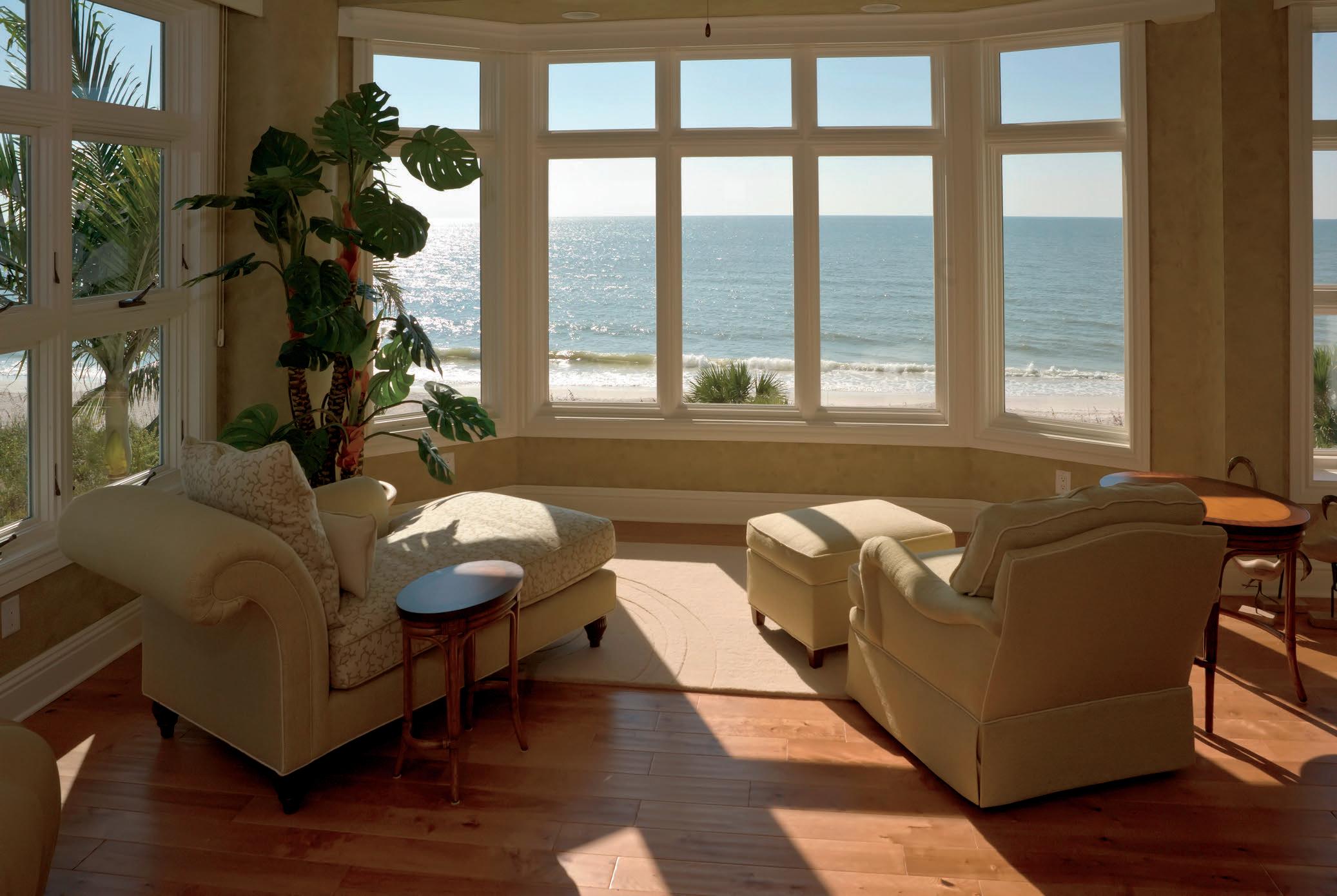
**Not including plastic containers that come with a lid. ***Supermarkets, pharmacies, eateries and health and disability services will still be allowed to provide plastic straws to disabled people. Disabled people will still be able to buy them online as well.
The use of plastic, non-compostable produce labels will start to change. From 1st July 2023, labels on domestically grown produce intended for the New Zealand market must have a label that is more compostable. Industry is working towards developing a fully home compostable label by mid-2025.
Business East Tāmaki has a vision to be recognised as the most environmentally sustainable business district in Auckland, with a target to lead positive change. Many of our larger businesses are already playing their part to address the climate crisis. However, many of our smaller business owners have indicated the challenges they face including lack of time, resources and capability. We need to support the East Tāmaki business community to take environmental action in a practical, yet effective way, which includes:
• Showcasing best practice and identifying projects or case studies that are real and inspiring
• Supporting businesses to develop skills, knowledge and capability to reduce emissions


• Implementing additional initiatives for environmental sustainability
In 2022, Business East Tāmaki’s General Manager, Ruth White, was selected to be part of the C40 Auckland Women4Climate Mentorship Programme. Created as a partnership between Auckland Council and global mayor’s network C40 Cities, the programme pairs emerging women climate leaders with senior experts in their field. Through a series of mentoring sessions, training workshops and networking events, mentees are supported to take their climate action projects to the next level.
Training sessions covered topics such as being a climate change leader and influencing others, effective communications and negotiating, finding common ground and overcoming entrenched resistance, plus technical topics like carbon accounting.
Ruth was asked by her Women4Climate mentor, Kate Wilson Butler, (Sustainable Business Council’s Head of Climate Action), what her definition of success would be for this project.
“This simple question has helped me to guide our priorities and actions,” she says.
“What are the big issues in our business community? For example, 72% of Business East Tāmaki’s annual member survey respondents selected the need for waste solutions as their top sustainability issue. How can we support businesses to combat this issue?”
“There are several projects the East Tāmaki industrial area could advance, with the transport and energy sectors being obvious big-ticket items. With guidance from the
mentorship programme, I look forward to co-creating solutions with local businesses to contribute to Auckland’s shared goal to halve emissions by 2030,” says Ruth.
4. Please select the top two sustainability issues for your business
Women leaders played a critical role in negotiating the Paris Agreement and continue to drive ambitious climate action in cities, businesses and NGOs around the world. Women make up more than half the world’s population, and are often disproportionately impacted by climate change. Their leadership and participation is therefore critical in solving this global crisis.
A free online toolbox making it easier for small businesses to assess the sustainability of their organisation and their supply chain has been launched by Docket, a public-private partnership, led by the Sustainable Business Network (SBN). It helps businesses check and improve their performance in six key areas of sustainability.
About 70% of a business’s sustainability impact comes from its supply chain says Holly Norton, Regenerative Design Lead at SBN. "There are about 546,000 small businesses in Aotearoa New Zealand. Together they can make a massive difference in reducing their impact on the environment.
“At the same time, being more sustainable can reduce costs, attract and retain customers and staff and help you get ahead of the competition.”

Docket starts with a quick self-assessment to see how well a business is looking out for the environment and its team. Where businesses are doing well, Docket provides examples of howthey can share those sustainability achievements with customers and networks. In areas where improvement is needed, it provides links to tools and resources.
Businesses are encouraged to share Docket to make their supply chains more sustainable.
Docket is a collaboration led by the Sustainable Business Network with The Medical Assurance Society (MAS); Ministry of Business, Innovation and Employment; Ministry for the Environment; Wellington City Council; Westpac NZ Government Innovation Fund and WorkSafe.
To find out more, go to sustainable.org.nz/docket
New Zealand’s first nationwide regulated product stewardship scheme for recycling used tyres will start operating later this year.
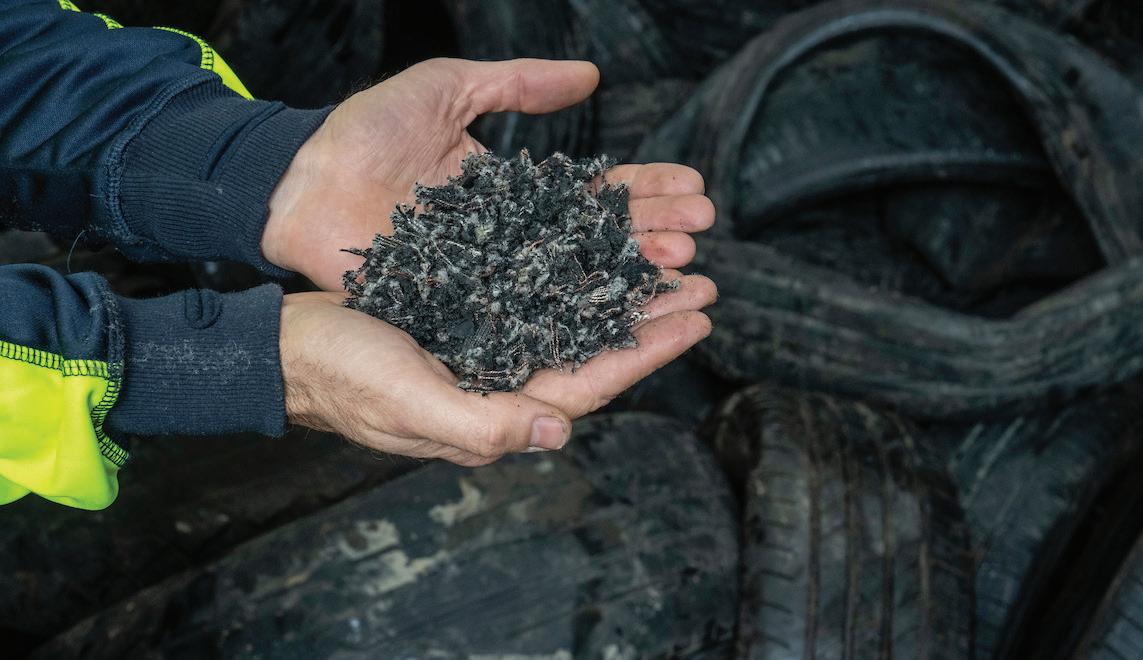
Used tyres that reach end-of-life in New Zealand are estimated at 6.5m each year. The new scheme, known as Tyrewise, will cover end-of-life tyres (ELTs), ensuring a positive environmental outcome for the used ones.
Tyrewise was set up in 2012 as a result of the co-designed product stewardship scheme for ELTs. Regulation is required under the Waste Minimisation Act 2008
to ensure the whole industry participation is mandatory.
The Government has declared six priority products for regulated product stewardship under the Waste Minimisation Act 2008. This is part of a wider plan to reduce the amount of rubbish ending up in landfills or polluting the environment.
Plastic packaging, agrichemicals and farm plastics, large batteries and e-waste, and refrigerants are next on the list of regulatory product stewardship.
Regulated product stewardship is when regulations are used to increase circular resource use and place responsibilities for managing end-of-life products on producers, importers and retailers, rather than on communities, councils, neighbourhoods and nature.
To find out more, go to environment. govt.nz/what-government-is-doing/ areas-of-work/waste/productstewardship/regulated-productstewardship/
Damian Light was elected Chair, with Bo Burns Deputy, with the board able to call on the expertise of former chairs David Collings and Adele White, and the experience of members John Spiller, Mike Turinsky, Peter Young, Katrina Bungard and Bruce Kendall.
The Christmas quiet spell comes quickly after boards are inaugurated, but there was no respite with an Auckland Council Annual Budget calling for cuts, a Local Board Plan to produce, and two adverse weather events to deal with.
One thing is certain though, life goes on, and just as no business ever escapes having to make tough choices, that’s no different for the Board.
The Annual Budget called for $1.1million in savings, but contractual arrangements mean that can only come from the Locally Driven Initiatives Budget, leaving discretionary spending to be almost halved.
Any business or organisation would struggle to make cuts of that magnitude, and the Board was left with decisions certain to impact the community, forcing changes to service levels, funding for local groups, and ultimately altering its planning for the area’s future.
Despite that, the local economy remains a cornerstone of Board thinking.
No community can survive without the businesses that provide employment, spend money in the local area, and are fundamental to everyday life, from the corner store to the mega outlets and manufacturers.
Howick remains committed to working with the business community, town centre organisations and groups such as Business East Tāmaki.
All Tāmaki Makaurau boards must produce a Local Board Plan – a new one follows each election - and every year must deliver services based on that plan.
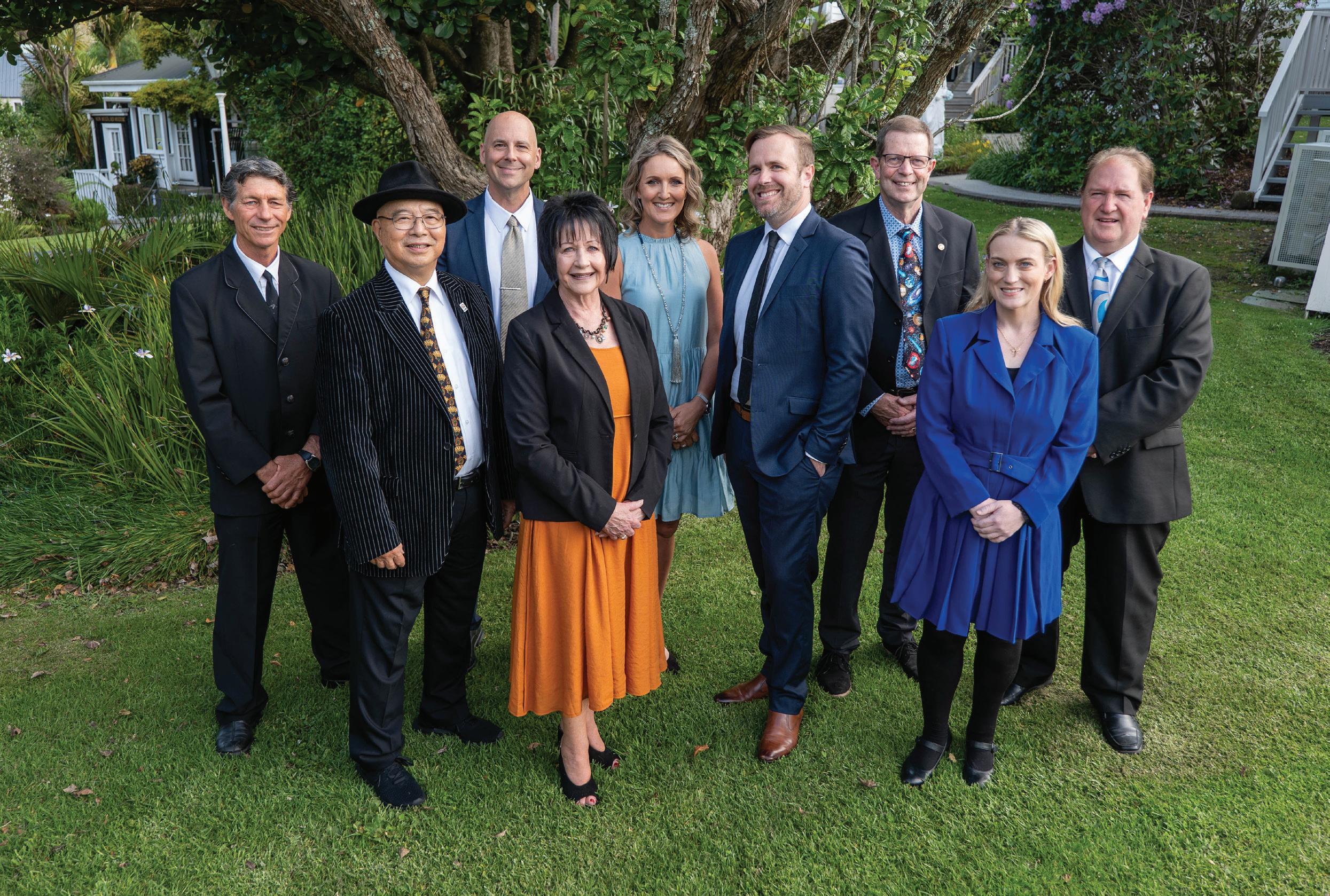
Howick has identified priority areas for 2023-24 that include initiatives designed to increase public safety. That’s a hot topic because how residents and businesses feel about their safety in their own communities affects what they do and where they do it.
In the past that’s seen street lighting improved and CCTV cameras added
It isn’t always ‘big ticket’ items though, as the Board approval of the Business East Tāmaki request for an alcohol ban on the Highbrook boat ramp to curtail unruly behaviour demonstrates. The Board appreciated the input from local businesses and the NZ Police in making the decision, providing practical context the problem was causing.
The Board also wants to work with businesses around awards, because the community role business plays, from sponsorship and on to employment, should be recognised.
As a ‘local’ board, Howick will continue to work alongside ‘local’ business, because it’s good for the community and the people who live and work in it.
To make up for the stormy La Niña summer we’ve just had, here’s hoping for a calm and sunny Autumn before we head into the cooler days. But whatever the weather, a good book can always be enjoyed, and here’s the picks from Tony Moore at Poppies, Howick. Whether it’s self-improvement, a bit of general knowledge, or sheer escapism, they cover a bit of everything!

No woman is an island. Look around. Family. Friends. Strangers. Even the woman you believe just ruined your life might turn out to be your best friend. Because together you can do anything – like take back what is yours . . . ‘A compelling, full-of-heart novel about the power of female friendship’
- Kirkus By Jojo Moyes
Beginning around 3,500 BC with the wheel, and moving through the eras of horsepower, trains and bicycles, Tom Standage puts the rise of the car – and the future of urban transport – into a broader historical context. A Brief History of Motion is an essential contribution to our understanding of how the modern world came to be.
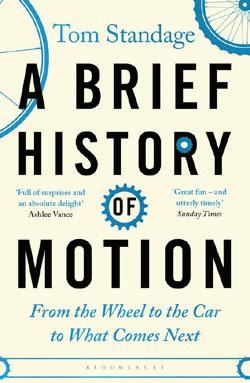 By Tom Standage
By Tom Standage
A gripping psychological thriller from NZ's Booker Prize-winning author of The Luminaries. Birnam Wood is a brilliantly constructed tale of intentions, actions, and consequences, providing an unflinching examination of the human impulse to ensure our own survival.
 By Eleanor Catton
By Eleanor Catton
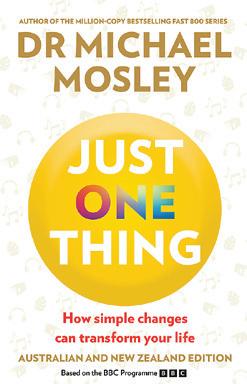
Did you know that eating chocolate can help your heart, that singing can give you a natural high and that your obsession with houseplants can boost your productivity and brain power? Dr Michael Mosley unearths a range of Just One Things, whose impacts are so surprising and intriguing you will be desperate to try them out.
By Dr Michael MosleyFor as long as Lucia Gomez has been the police chief in the city of Highland Isle, near Kindle County, she has known that any woman in law enforcement must walk a precarious line between authority and camaraderie to gain respect. Bestselling author Scott Turow returns with a riveting legal thriller in which a reckless private detective is embroiled in a fraught police scandal.
By Scott Turow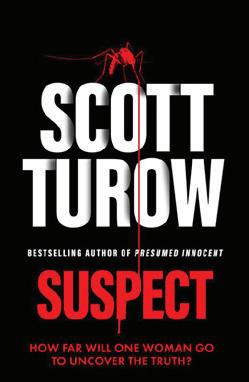
83 Picton St, Howick 2014
www.poppiesbooks.co.nz
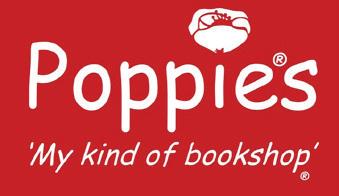
howick@poppiesbooks.co.nz
09 5329642




Poppies Howick donburi, be happy!
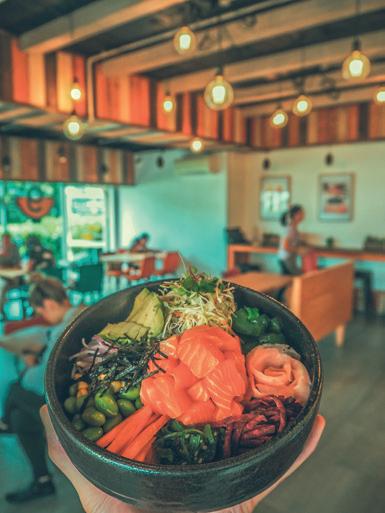




23 February 2023
It’ll be a big year for east Auckland, with construction starting on the Eastern Busway in Pakuranga. The first section of work is an extension to William Roberts Road, which will be completed before Reeves Road is closed and the flyover is built. Clear signage and project staff will be on site to help everyone through the changing road layout while the work is taking place.
The project will change the road environment of Ti Rakau Drive and increase the number of pedestrians, cyclists, and vulnerable users. The priority is making sure everyone is safe. To help people cross Ti Rakau Drive to get to the new bus stations, raised safety platforms will be installed on Ti Rakau Drive near Gossamer Station at the Gossamer intersection, and near Pakuranga Station at the intersection with Palm Avenue. A raised pedestrian crossing will also be installed on Ti Rakau Drive at Edgewater Station. The raised safety platforms will calm the speed of traffic without causing significant delays.
Safety is being improved in several other areas of the project’s design, including: traffic light phasing, reducing the size of intersections, increasing median islands for people waiting to cross, and cycleway separators on footpaths to ensure the safety of cyclists and pedestrians.

Date in 2023 Information
February to May
Auckland Council are processing resource consents for the Eastern Busway sections between Pakuranga and Ti Rakau Drive Bridge. A public hearing is scheduled to be held in May.
From early 2023 Work sites are being established on Pakuranga Road, Ti Rakau Drive and William Roberts Road, and may include the relocation of some bus stops while construction work is in progress.
Ongoing to mid-year
May
Deconstruction and removal of vacant properties along Ti Rakau Drive and William Roberts Road
Planned lodgement with Auckland Council of the consent applications for the commercial precinct on Ti Rakau Drive, the Burswood area and towards Botany. It is currently anticipated that these will be publicly notified.
Ongoing
Discussions with AT on how best to manage speed and ensure safety for everyone when the busway is completed. Ti Rakau Drive will be a very different environment when the busway is in place, with thousands of pedestrians crossing it every day to catch a bus. The Eastern Busway team need to ensure that pedestrians are safe and that motorists drive within the speed limit. They’re working with stakeholder groups to ensure safety measures are effective and disruption is minimised.
Here are the contact details for the Eastern Busway Alliance team:
Email: info@easternbusway.nz

Website: easternbusway.nz
Phone: 0800 BUSWAY (0800 287 929)
John Bolton
Industrial Sales & Leasing
M 021 925 016
Katie Wu
Industrial Sales & Leasing
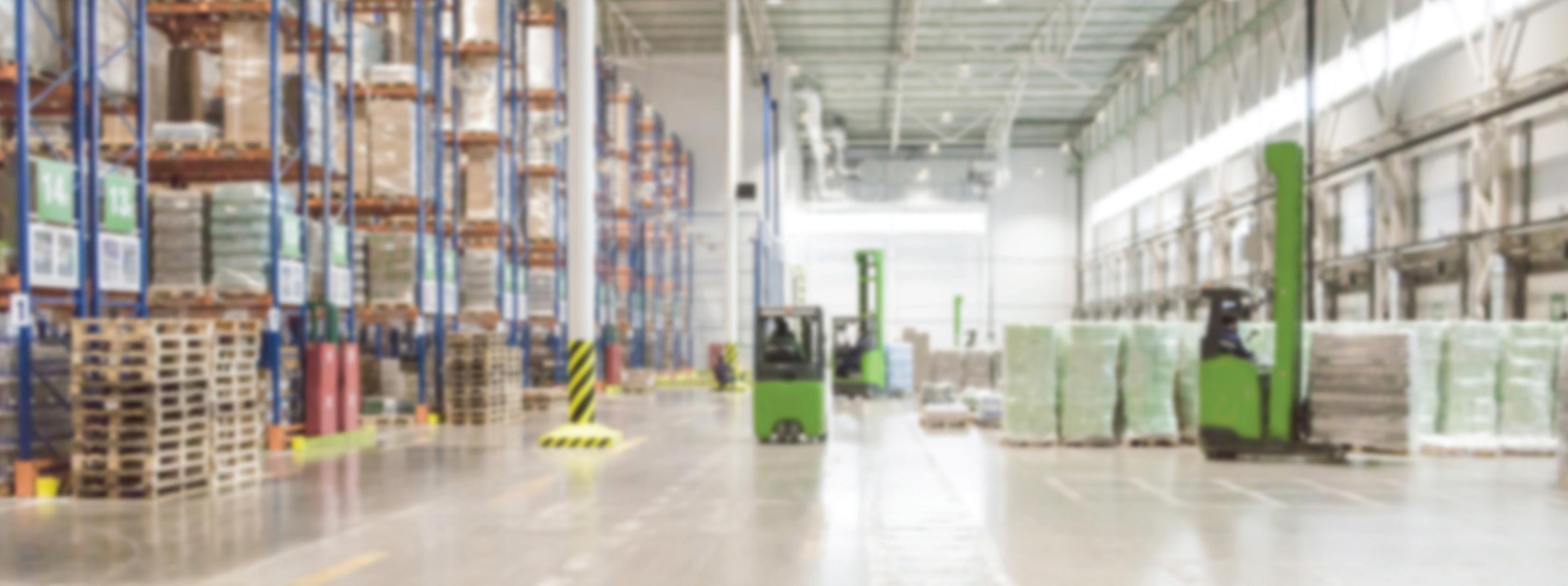
M 027 230 7895
First time on the market in 25 years
One site back from Ti Rakau Drive
2,436m² land
Drainage, power and water on-site
Total floor area - 420.10m² approx.
– Two roller door access points, rear and front
– Seven allocated car parks
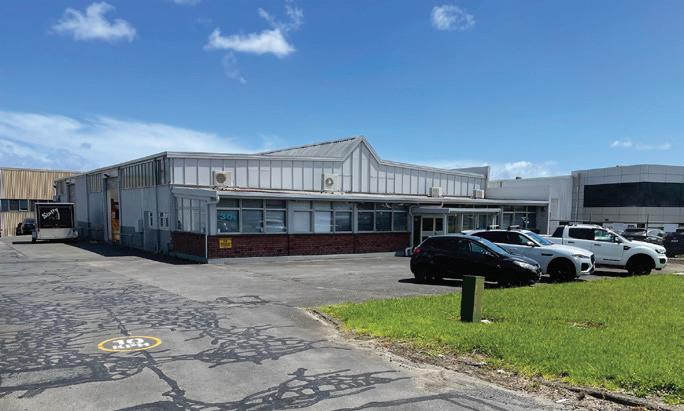
E katie.wu@barfoot.co.nz
David Campbell
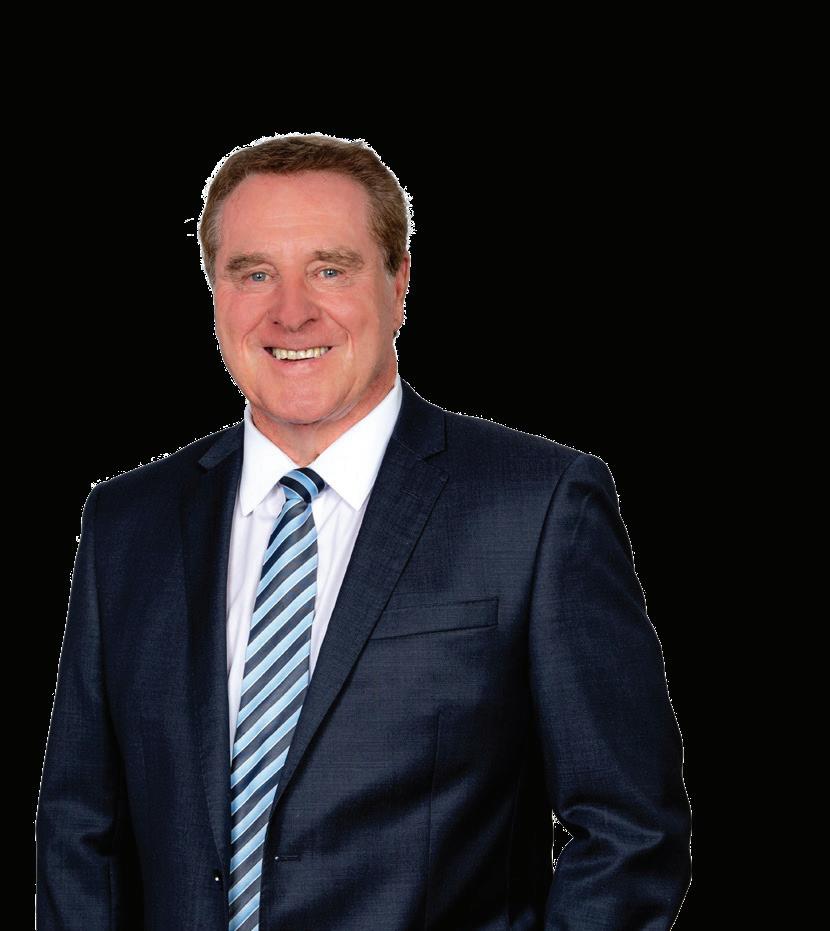
Commercial Sales Manager
M 021 642 188
E d.campbell@barfoot.co.nz
– 1,591m² high-stud factory warehouse
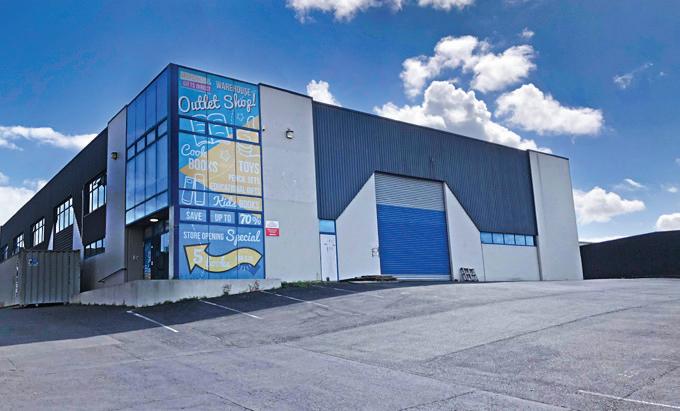
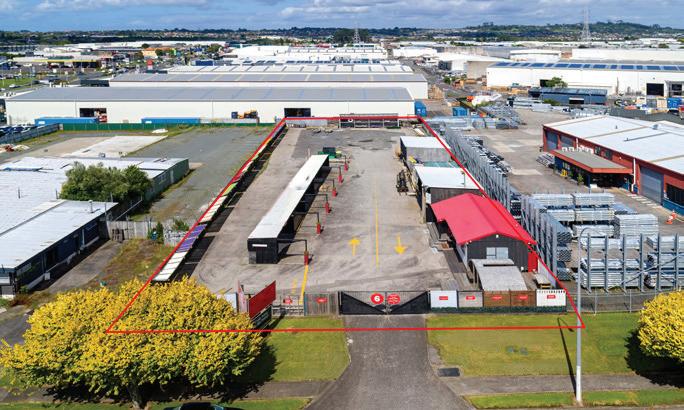

Office over two levels – Two roller doors
On-site parking
– 417m² level 1 office
Situated within Highbrook Crossing
– Signage rights available
–
South Auckland Commercial
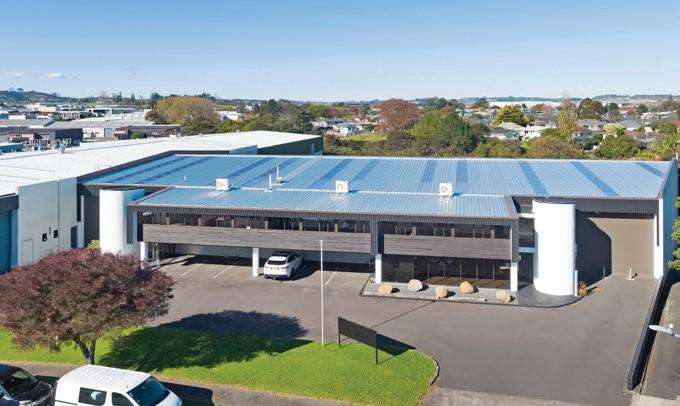
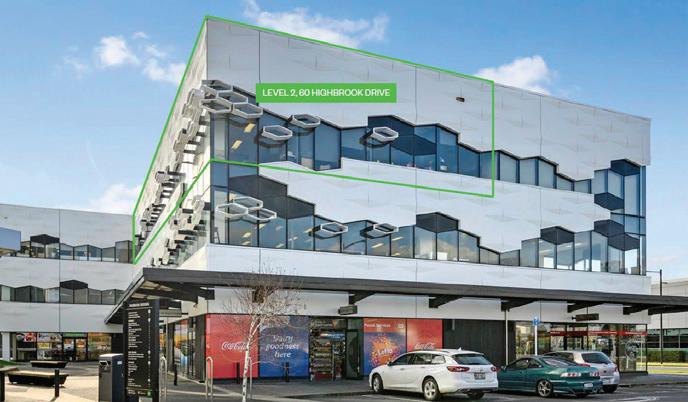
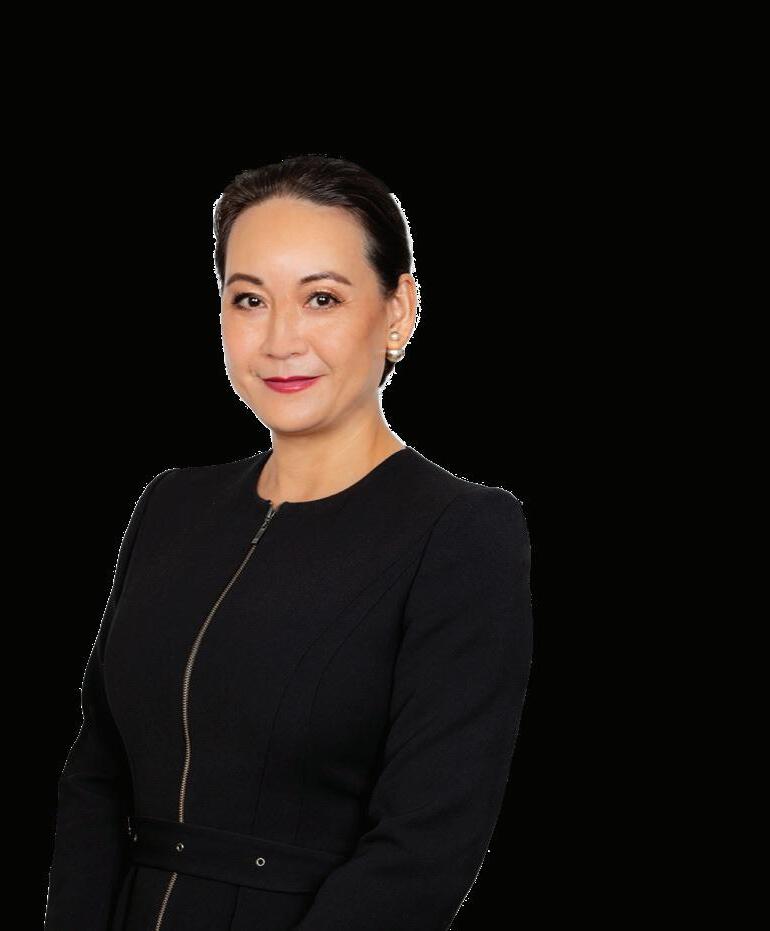
Ground Floor, RSM House, 62 Highbrook Drive
T 09 263 8412
E sacommercial@barfoot.co.nz
Building area
1,810m² Building area
736m²
E john.bolton@barfoot.co.nz barfoot.co.nz
